Fathers on Father’s Day
Tackling the joys, challenges, and lesser-known aspects of fatherhood
Sunday, June 16, 2024



Tackling the joys, challenges, and lesser-known aspects of fatherhood
Sunday, June 16, 2024


- How three generations of men contributed to 100 years of serving the people of Guyana
OPTOMETRIST Don Gomes, the third generation of opticians in his family, announced that the business, birthed by Neville Schuler and his grandfather’s brother, Joaquime Gomes, has been serving the people of Guyana for the past 100 years.
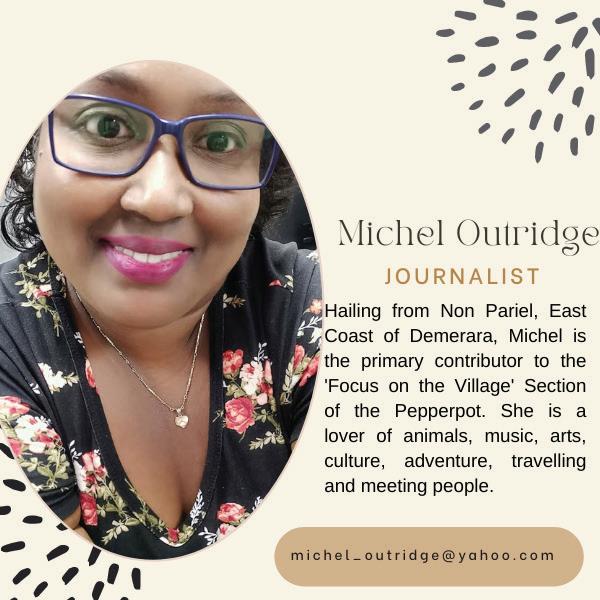
Schuler and Gomes Optical was established in 1924. He related that it was Schuler who started him out in the British days. He was instrumental in bringing optics to Guyana from Germany.
with Schuler to start their own business as opticians.
Gomes told the Pepperpot Magazine that the small business was founded and located on Main Street, Georgetown. He stated that his father and his brother came with Schuler, but his uncle went into mining in Region One (Barima-Waini) while his father partnered
Gomes disclosed that his father went to Philadelphia, USA, to study optics and he eventually took over the business from Schuler in its entirety upon his return to Guyana after completing his studies.
He added that over time the business was passed onto his father, and it was still named Schuler and
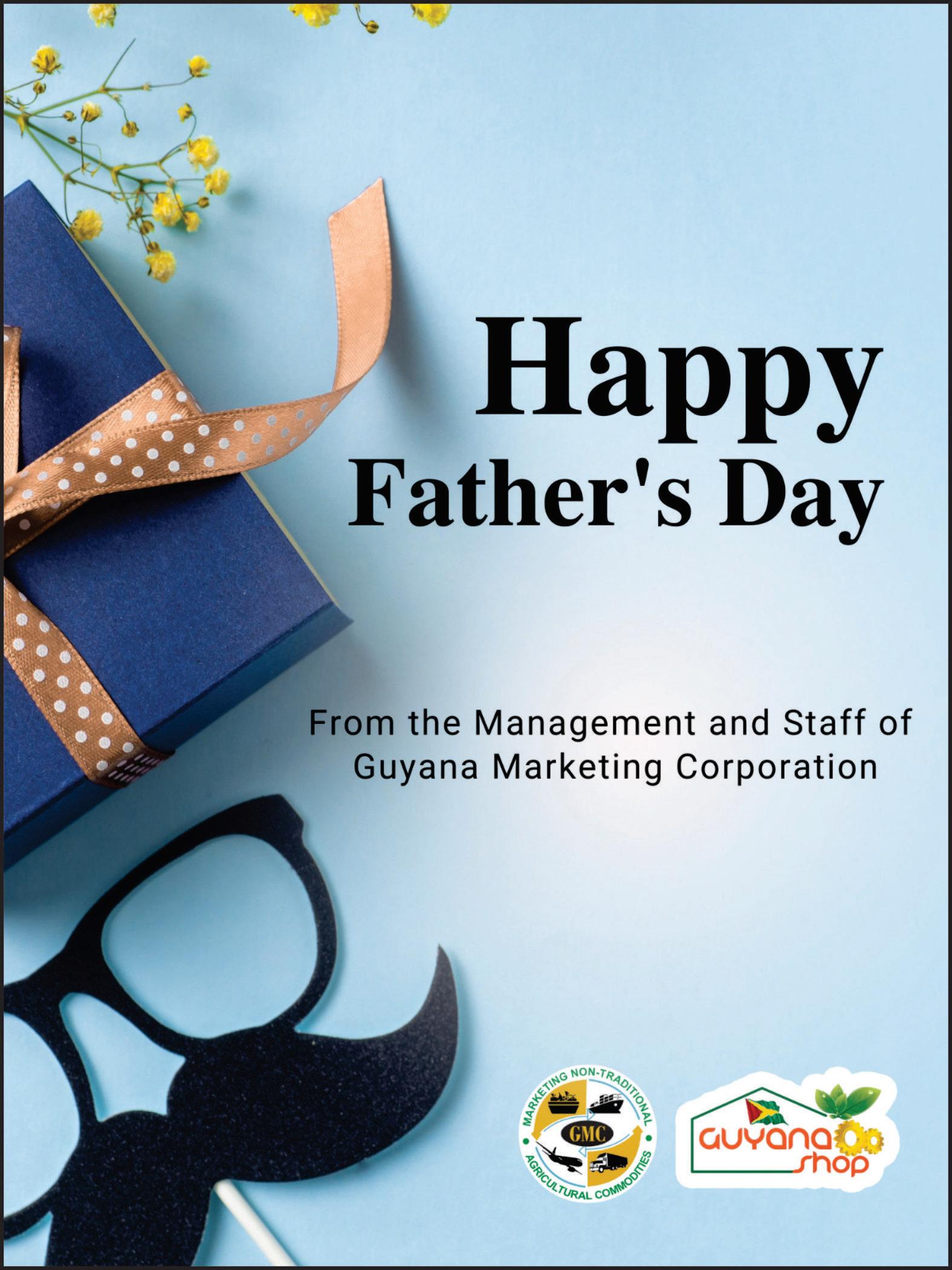
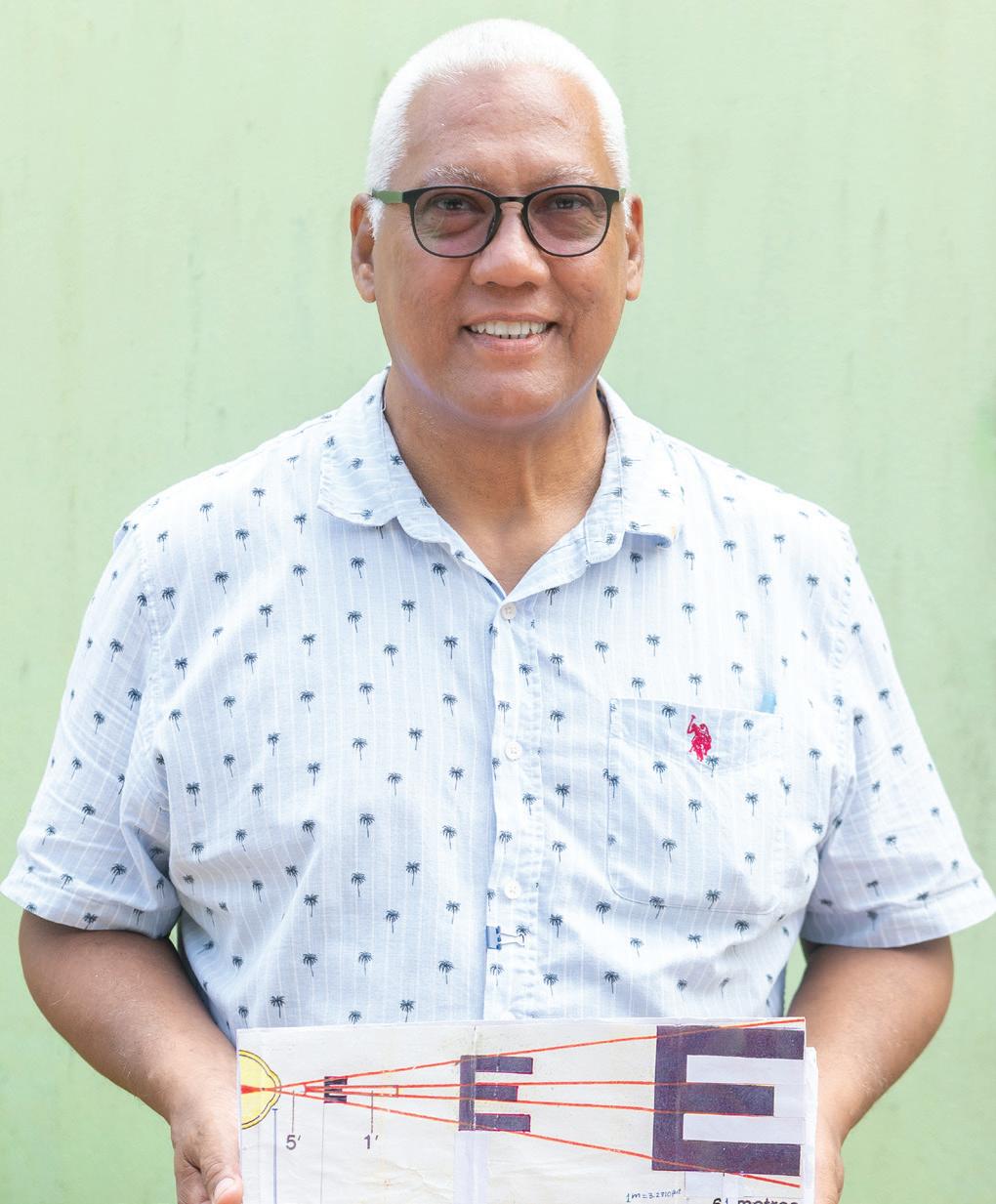
Gomes, then renamed Das and Parris when he (Schuler) retired in 1973.
Gomes explained that his father, Rudolph Gomes, later partnered with Cecil Das and Aubrey Parris to sustain the optical business in 1974, and it was relocated to Cummings and Middle Streets, Georgetown.
He reported that the trio sponsored him to study abroad, and in 1983, he graduated in Canada and returned to Guyana to join the staff of opticians.
Gomes told the Pepperpot Magazine that from 1983 onwards, between Guyana and Canada, they continue to serve the nations, and he will do so until he is retired, maybe this year.
“I had a wonderful ca -


SATURDAY, June 8, saw a group of unique men come together to celebrate a fantastic cause: fatherhood. Members of the Guyana Wesleyan Church hosted “Men in Concert” a day dedicated to fathers. That morning, over three hundred men gathered to celebrate their journey of raising children. Together, they are working to change the narratives surrounding fatherhood. They are tackling various issues, including relationships with fathers, new experiences, and sharing the challenges all dads face but may not talk about.
The Pepperpot Magazine sat down with three men to discuss the stages and trials of fatherhood. From becoming a new father to becoming a father figure to others, fatherhood is as tough a journey as any and twice as rewarding.
Going the extra mile.
Clairmont Boucher holds the position of superintendent of the Guyana District Wesleyan Church. Reverend Boucher, a father of three, has dedicated much of his life to his family. As Father’s Day approaches again, he spoke about the importance of celebrating the men and women in our lives, citing the excitement surrounding Mother’s Day. “Very often, as we know, when it’s Mother’s Day—and rightly so—many flow-
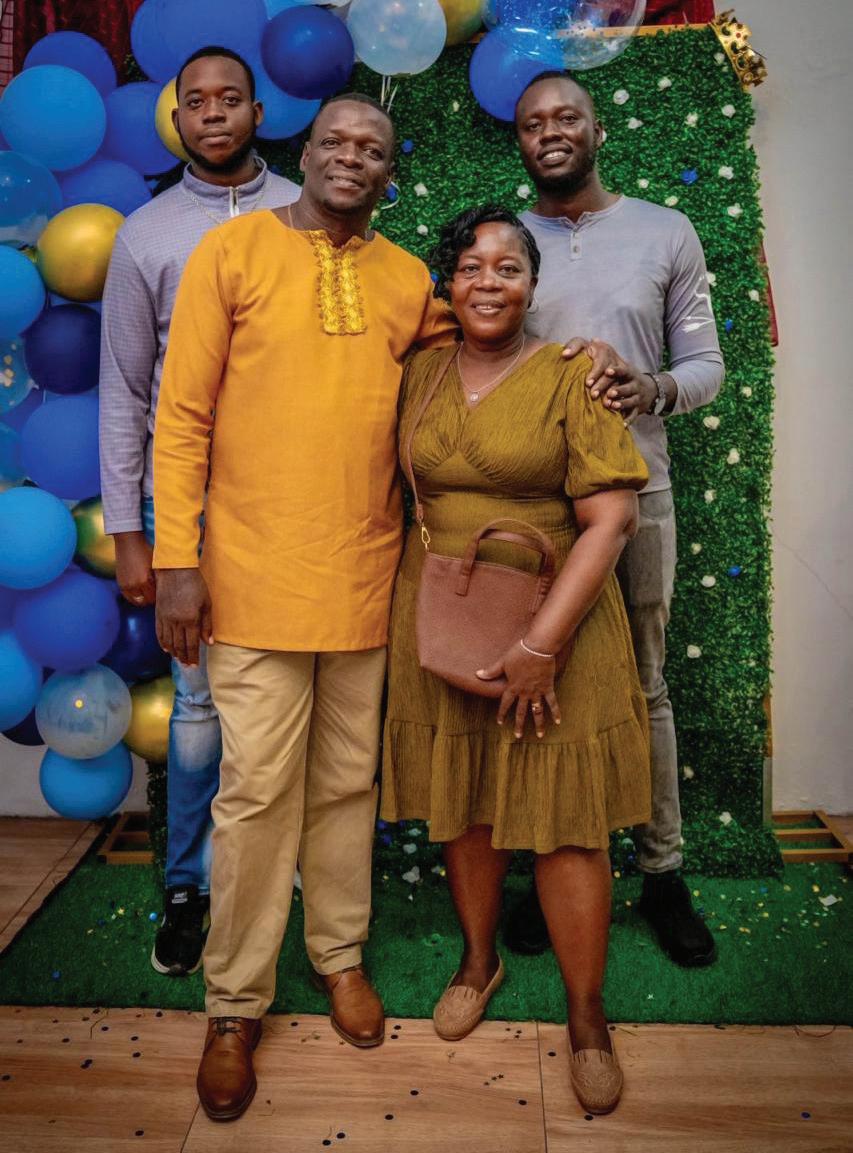
ers, many wishes, the fuss that centres around celebrating mothers seems natural, comes easy for many people because in many homes fathers are absent,” he shared.
Speaking of his relationship with his father, he mentioned that he came to know him later in life. He emphasised the interesting fact that all fathers should be appreciated, regardless of when you get to know them or what role they have played. He said, “My biological father and I became very close later in my life, and that was instrumental and pivotal in changing some things in my generational line. I think as we speak of honouring our fathers, the word ‘honour’ speaks of respect, and that commandment is given to us. It doesn’t say whether he serves God or not, whether he’s been a good father or not.”
Regarding narratives, Reverend Boucher and his colleagues hope to change the idea behind conventional fatherhood. He highlighted the changing roles of fathers, stating,

“We want to change the narrative, and we believe that as we seek to honour fathers—both biological and spiritual—we can change some things in our society. So this Father’s Day, we want to shout out all the fathers, all the fathers who’ve been doing not just the 9-to-5 but going the extra mile.”
Becoming a new father
Adrian Ageday remembers the exact moment he became a father. The young father says the moment he held his daughter for the first time is etched in his mind. “Becoming a father is a memory that is lodged within my mind, I believe until forever. I was at the Georgetown Public Hospital, and the nurse had to chase me home the day my daughter was coming into this world. It was a bittersweet moment because I wanted to be there. But the nurse, rightfully so, said, ‘This is a female surgical ward, and you cannot stay here, sir. But when you come back, you’ll be the first one to greet her.’ And so, when I was given that privilege to go into that room for those 10 seconds, my heart melted to see that my sweet little daughter had come into the world.”
At only 29 years old, Adrian has learned plenty about fatherhood in the few short years since his daughter’s birth. The biggest lesson he and his wife have learned is selflessness. “My daughter teaches us things that no other aspect of life could have shown us. Teaching her to walk, to talk, to hold a spoon, to greet people, and so on. Seeing her with her different moods and attitudes, hearing her get up in the middle of the night and say, ‘Daddy, Daddy, Daddy,’ because something bit her or something is scratching her skin, and without fail, without even thinking about how tired you might be.”
As someone with countless father figures, this Father’s Day, Adrian urges us to appreciate the men who have taken up the mantle. He states, “Your biological father might not be here with you this Father’s Day, but I’m sure there are other men—probably an uncle, a grandfather, a godfather, a spiritual father, a youth pastor, or someone in your assembly. Whoever it may be, you can show them love this Father’s Day. You don’t have to go to great extents; whatever you can do, men appreciate it. No matter how small the token might be, men appreciate it.”
The mental stress of fatherhood
The mental stress of fatherhood is not something that is talked about enough. Assistant Superintendent of the Wesleyan Church, Julian Paul, is working towards changing that. Coming from a broken home and now a father himself, Reverend Paul is a voice for men who may not be ready to share
their challenges. He shared, “There are times when many dads don’t really know how to express themselves in words towards their children or their family, but they show their love and care by hard work and supporting their family.”
Reverend Paul further emphasised the importance of support among men, stating, “Sometimes it’s not easy to be a man. However, it is told to us that as men, we must be able to share our trials, concerns, troubles, and difficulties with other men so that we can have people in our lives who will be a source of encouragement, who can boost us to go on in spite of the many challenges in life.”
As yet another Father’s Day comes, going the extra mile is important. Although socks, ties, and cards are welcome, talk to the men in your life and let your father know just how much you care.

MOST fathers of grown children would have so much to look back on this Father’s Day 2024. It’s another day of reflection, and the hope is that the reflections of the past year, and years gone by, are very pleasant.
However, the reality is that there are a few fathers who have lost a child since Father’s Day 2023. It is always devasting for a parent to lose a child. There is that saying that “A parent should not have to bury a child”. Unfortunately, that most heart-breaking tragedy does occur from time to time. To those fathers who have had such a tragic experience, especially during the past twelve months, we send condolences to you. While we know some of you grieving fathers, there are those who we do not know; men who live quiet lives away from the spotlight.
Nonetheless, we mourn your loss on this special day when you are thinking of the child who has gone before you, and know that they are thinking of you from where they have transitioned.
Unfortunately, some fathers are also estranged from their children. These are fathers who, in some instances, create a
situation which results in disrespect from their child; being an alcoholic, for instance. It doesn’t matter where the fault lies, because it is always sad when a father and his children are not speaking. There is the saying, “For every problem, there is a solution”. As such, whatever might have been the issue that caused deep friction between father and child, every effort should be made to resolve the situation. Of course, that might be easier said than done in quite many cases, but giving it a try is always worthwhile. In such situations, elders in the family can play a most important role as mediators. Family frictions are often resolved during family gatherings, such as at Christmastime, family reunions, birthday parties and, of course, on Mother’s Day and Father’s Day.
As an older father, I usually reflect on when I took my then-preteen daughters to many rural and hinterland areas of the country. It was my plan not only to take them along with my wife, Pat, to some of the posh restaurants in the


city, but also to many of the far-flung communities of Guyana and see and experience those areas of their native land. I desired to ensure that they knew as much of their native land, beautiful Guyana,
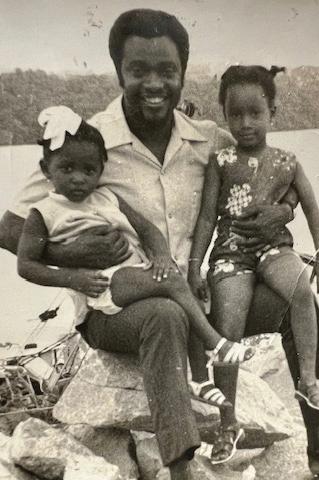
as possible. Taking them on such tours was also practical geography lessons. Those tours also gave them practical knowledge of the varying Guyanese accents, the most striking being at Black Bush Polder on the Corentyne Coast, Region Six. As I reflect on those times of their pre-teens, teens, and twenties, I realise there is much to be happy about and to reminisce about with satisfaction.
I am now at a stage of life when I am well qualified to advise younger fathers. Having said that, it is apt to state that I am approached from time to time by younger fathers for advice on many issues of fatherhood. To grandfathers, fathers, especially new fathers, we extend Happy Father’s Day 2024, and wish that you are able to cope with the many challenges of being a good father, here in Guyana, as well as in the Diaspora.

SETRA O’SELMO has always known a Rastafarian way of life. Ever cognisant of the benefits of many aspects of this lifestyle and wanting to share same, and also wanting to clear up some major misconceptions about it, she found the perfect way to do it all through Locsfest, an annual festival she created to celebrate persons with ‘locs.’
She started the event last year and was pleasantly surprised to see more than 500 persons show up, indicating their interest in the Rastafarian culture. The intention is to do it every year on the last Sunday in June, and so this year’s ‘fest’ will be on June 30.
The one-day event at the Linden Theme Park, where the ‘I Love Linden’ sign is located, will kick off at 11 am and go up to 22:00 hours, and promises a variety of events related to fashion, craft, body art, preparation of vegan meals, care of the
Setra has been a Rastafarian all her life and wouldn’t have it any other way

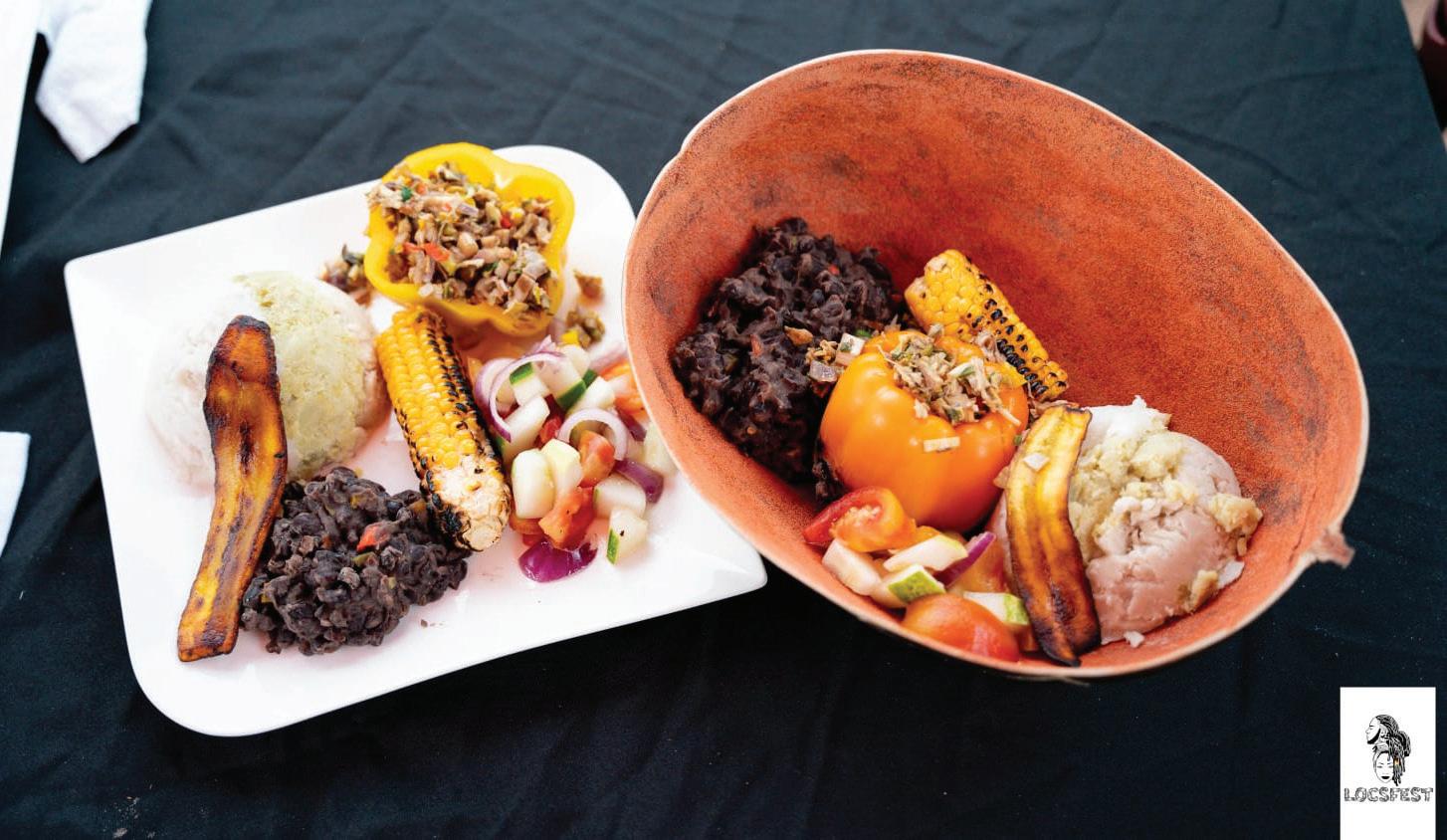




Attendees at last year’s
hair and skin, among others.
“We know the world is getting greener and everybody is going healthier, but not many persons understand how to prepare vegan meals. They feel that it is boring and tasteless and so expensive,” Setra shared in an interview with Pepperpot Magazine.
So her aim is to use Locs-
fest to show people how they can be creative with their meals, make them simple and inexpensive, and understand the health benefits that come with it. “All my life, I have been a Rastafarian, and as I get older, I realise that people have so many health issues which come from their activities and how they eat,” the beautiful 36-year-old
observed.
“I wouldn’t change who I am because I know it’s a right path. My family and I have never been hospitalised for anything and I know it’s because of our habits,” added Setra, who is originally from Nottinghamshire, Linden, now residing in Ame-
FANS of the Nothing to Laugh About (NTLA) show are again in for a treat with a production that promises to be better than all the rest, with organisers boasting that they know exactly what triggers the ‘throw down’ laughter due to their years of experience on the entertainment stage.
The National Cultural Centre will come alive on Saturday, June 29, and Sunday, June 30, from 8pm, on both nights, with KFC’s Nothing to Laugh About 15.
This iconic event, featuring a stellar cast of characters, promises to be a spectacular showcase of talent, humour, and cultural vibrancy; perfect for the entire family.
“We do a lot of satirical comedy, and we deal with current affairs and trending things that made the news. But we are mixing that with humour; stories that we create, content that is just hilarious in everyday life,”
dam, Michael ‘Credit’ Ignatius, Mark ‘Chine Man’ ;Lo Li’ Kazim, ‘Mus Colleck It,’ ‘Officer Bribe,’ ‘Bladam,’ ‘Yankee,’ etc.
The team spends hours upon hours preparing and rehearsing for the show and often does not fail to wow their crowds. Their ideas are mostly derived from current news events, where the writers take serious issues and add a funny twist to them.
The show boasts an exceptional cast of actors, each bringing their unique flair to the stage. Others include Clemencio Goddette, Chris Gopaul, Gerard Gilkes, Panda, Shantel McClean, Sonia Yarde, Mark Luke Edwards, and Abigail Brower.
Producer Maria Benschop, who does most of her work behind the scenes, often goes the extra mile to promote her artistes whom she had once described as “awesome, versatile and sublimely talented.”


NTLA Director Lyndon ‘Jumbie’ Jones shared with Pepperpot Magazine this week.
“We are coming with real creative comedy, and we are trying to better the things we normally do. We are more aware now than ever what triggers the laughter; what creates the throw-down laughter. And we are very experienced now; we know the dos and don’ts.”
This year’s show will feature an unforgettable lineup of characters, including: Jumbie, Leza ‘Radika’ Singh from Parika Back -
“These talented performers are set to deliver a memorable experience that will leave audiences in stitches,” NTLA said. Tickets prices are $2,000, $3,000 and $4,000, and ticket locations include Fresh Supplies Seafood Depot (Sheriff St.), Silvies Variety Store, Payless Variety (G/ Town), and NCC.
The generous sponsors whose support has been instrumental in bringing this annual production to life, ensuring that it continues to delight and entertain audiences, are KFC, Peppys, Silvies Industrial Solutions,
Fresh Supplies Seafood Depot, Payless Variety Store, Muneshwers Travel Service, and Gemini Cocktails.
The producers would usually incur lots of expenses, but they often express that they continue to hang on because of their love for comedy and what they do.
“Mark your calendars for June 29 and 30 at 8 pm and join us at the National Cultural Center for a night of laughter, joy, and unforgettable performances. KFC’s Nothing to Laugh About 15 is not just a show – it’s an experience you won’t want to miss!” NTLA said.

COUNTLESS boats and even more people venture to Fort Island daily. The captivating little island has developed into one of Guyana’s most popular tourist hotspots. Although the historic fort is what calls most, the people of the island are often what captivate visitors. The small community of people has become the definition of hospitable, as more people seek to experience the island. Among the people who help to create the experience of Fort Island is Videsh Debideen, a lifelong resident of Fort Island; he now plays a pivotal role in the village’s Transport and Harbours Department. As the tourists continue to outnumber villagers, Videsh is just one who encourages others to keep coming to the island; Fort Island is a unique place everyone should experience.
Life on Fort Island is among the most peaceful Pepperpot Magazine has ever seen. Surrounded by trees and a history as deep as the bond the people share, there was never a dull mo-
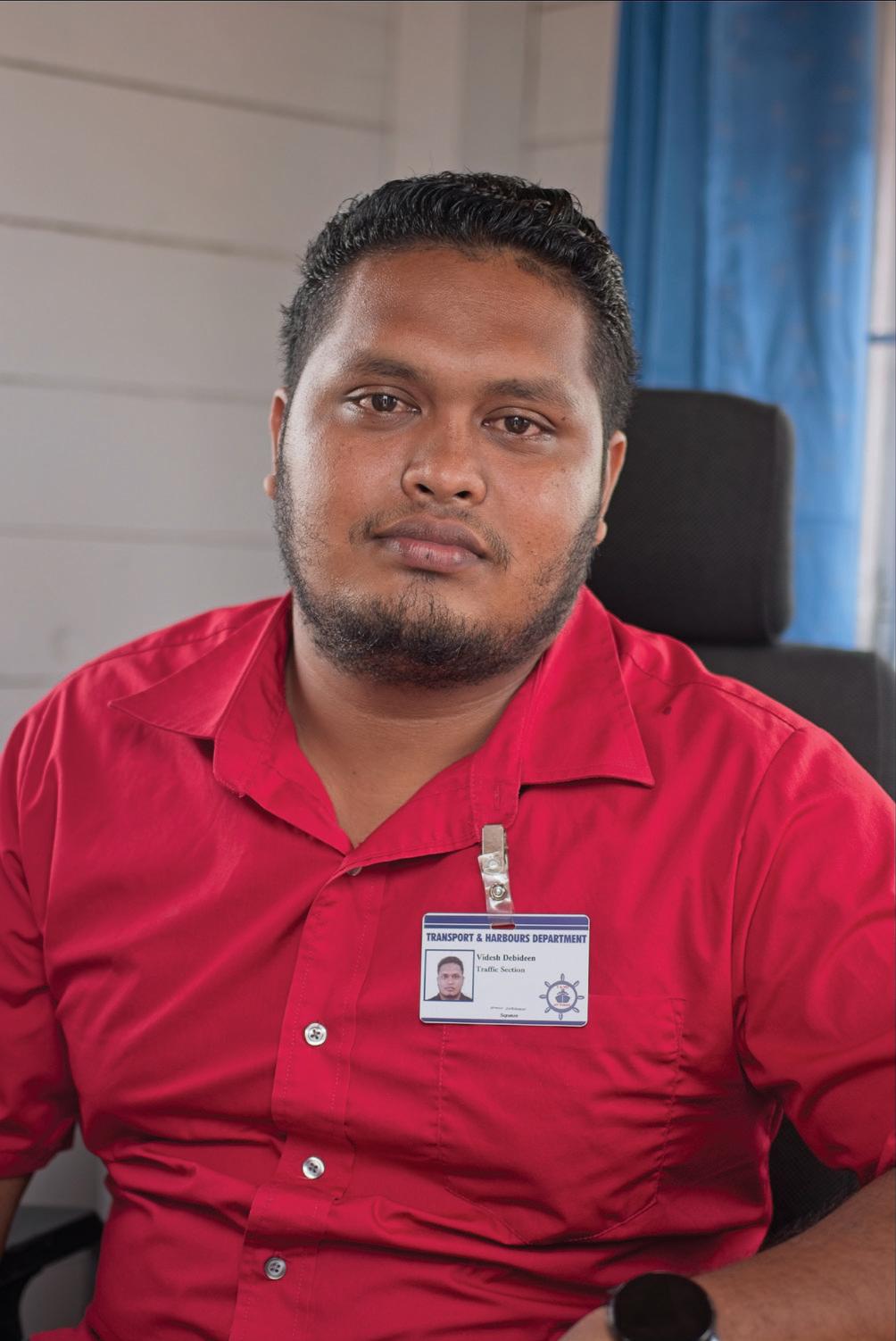
ment growing up on Fort Island. This is how Videsh describes it. The young man
is among the few sons of the soil Fort Island has to offer among its many set -

tlers. Today, he manages the village’s Transport and Harbours Department. His job is more than keeping track and making notes; Videsh knows much about Fort Island tourism, and even more about its people.
The popularity and historical importance of Fort Island cannot be overlooked. Videsh explained that Fort Island is most often the first stop on many Essequibo tours, “This port here is the main tourist destination in the city. So most tourists going up the river will stop here first. Weekends, our stand will be a bit busy. It’s not a busy port, but on weekends, we will have tour boats.”
Fort Island was shaped by its history, and this unique origin story, beginning more than two hundred years ago, keeps people coming today. As Videsh explained, “We actually have more persons visiting the island than the actual population because of the two historic sites. The Fort Island Court of Policy, which is now the Dutch Heritage Museum, and Fort Zealandia. Visitors will be very interested in the history of Fort Island. We have a rich, rich history.”
As one of the oldest intact remnants of Guyana’s past, people venture to Fort Island every day to get a glimpse of the many historical sites on the island. As Videsh shared, “People still come to see those sites. On a daily basis, we have two boats; approximately 30 to 40 persons daily. On

weekends, we have almost 400 to 500 persons per weekend. We have a ferry system in place currently; we have a ticket system.”
Visiting the island has been made easy by many investments of time and effort from many different people. Pepperpot Magazine ventured to the island from Parika; this is just one of the ways curious tourists can reach the island.
Fort Island has done a tremendous job of managing its ever-growing tourism sector. As more people visit the community, Fort Island sees more developments. As Videsh explains, “It’s easier in Fort Island, I would say. We see great development here. And the Stelling, the main port of entry, has been coming and rated for two years now since it opened to the general public. I would say, first, I would like to start by going up here. I find it calm, the tranquillity, the calmness of the place.”
As much as tourism is a big part of the island, the people have maintained a steadfast hold on their identity, keeping their diversity alive. “The environment, the people, and the small population. The two main economic activities here on Fort Island are farming and fishing. Some persons work with the government. We have a small population school. We have a health centre, primary school, a nursery, and a coast guard base. So, gradually, the is-
land is developing.” Videsh further added, “I can see significant change: Rehabilitation, a school for defence, drainage and irrigation, road, solar street lights. So, yes, our community is developing and not left behind.”
Videsh encourages those seeking adventure to visit the island, “I encourage persons who have not visited Fort Island or who have the mind to visit Fort Island. Fort Island is a peaceful place. You can come visit. You can make bookings with local tours. Or you can organize and make contact with the locals on Fort Island. And you can come take a tour. And, as I said, you can use the ferry service too. We, the people of Fort Island, are very peaceful.”
Moreover, visiting the island is similar to discovering a different aspect of Guyana, its history, and all that went into the past of all Guyanese. The people of the island add another layer of fascination and appreciation, as Videsh shares, “We are hospitable. And we are respectful too. I must say that the island has a rich history. That is most important. And it’s very peaceful. So, persons from the coastline and who are in the capital city. If you want to relax your mind, you come here from the hustling and bustling. And you can relax. It’s very calm and peaceful. We have beaches. And we have locals. We are very hospitable. It’s peaceful.”

A feeling of serenity and the presence of the past are the first things that strike visitors to the famed Fort Island. A historical focal point of Guyana, Fort Island is one of Guyana’s most wellknown destinations. Home to Fort Zeelandia, the stone walkways and overhanging trees create an experience that offers a glimpse into the past.
A small community with an estimated population of just 60 people, Fort Island’s visitors miraculously outnumber its residents. Today, this little plot of land in the Essequibo has developed into an island onto itself, with tourism on the constant rise. Most come to see the stone structure and the cannons left behind from colonial times, but life is very different for the people who call Fort Island home. Recently, the Pepperpot Magazine took a trip over the river and, through time, to delve into the village beyond the Fort.
Mohamed Nazam was led to Fort Island more than 20 years ago. Since then, he has dedicated himself to learning about the mysterious island, its people, and its true origins. Born and raised on a different island in the Essequibo, Mohamed moved to Fort Island because of one thing: his wife.
As he explained, “Well, I came here through my wife. My wife is a teacher, and she got a job here on Fort Island, so we had to move. And then again, my grandparents had some land here, which I am
occupying now. And none of them came to claim it.”
With the land, opportunities to work, and his wife by his side, Mohamed decided to settle on Fort Island, which was still finding its place and was nowhere near what it is today.
In years gone by, Fort Island was inhabited by very few people. The island is three miles long and boasts a modest mile and a half in width, making it one of the smallest in the region. Despite its size, Fort Island still houses a rather comfortable way of life for its people. With solar electricity and wells, the people of Fort Island are as close to self-sustainability as possible. The village is home to about sixty people who are involved in various diverse fields, crafting a ‘mini township’ of their own.
As Mohamed explained, Fort Island, although home to few, is home to hardworking and innovative people.
As he shared, “This is just a clustered community, you know. But they hold nearly more than three-quarters of the population. People have their livestock, pasture, and some do a little crop farming. But it’s just a little handful of us along this island. It’s like a little bit of a cluster like that.” Although there may not be much to traverse and see beyond the Fort on the island, it seems to be more than enough for most people.
Most of Mohamed’s time on the island was spent learning more about the little island that seemed shrouded in mystery. Throughout
the years, he has garnered little-known information about the island and has become the go-to man for information, facts, or just interesting tales about the ageold island. He shared a few lesser-known facts about his home. The first interesting fact is the island’s original settlers. As he stated, “Fort Island was actually settled by the Amerindians before the coming of the Dutch. The Dutch migrated from Kyk-Over-Al to Fort Island during the 10th to 13th centuries. Why they migrated was because the land at KykOver-Al was not suitable for production.”
He further added that the
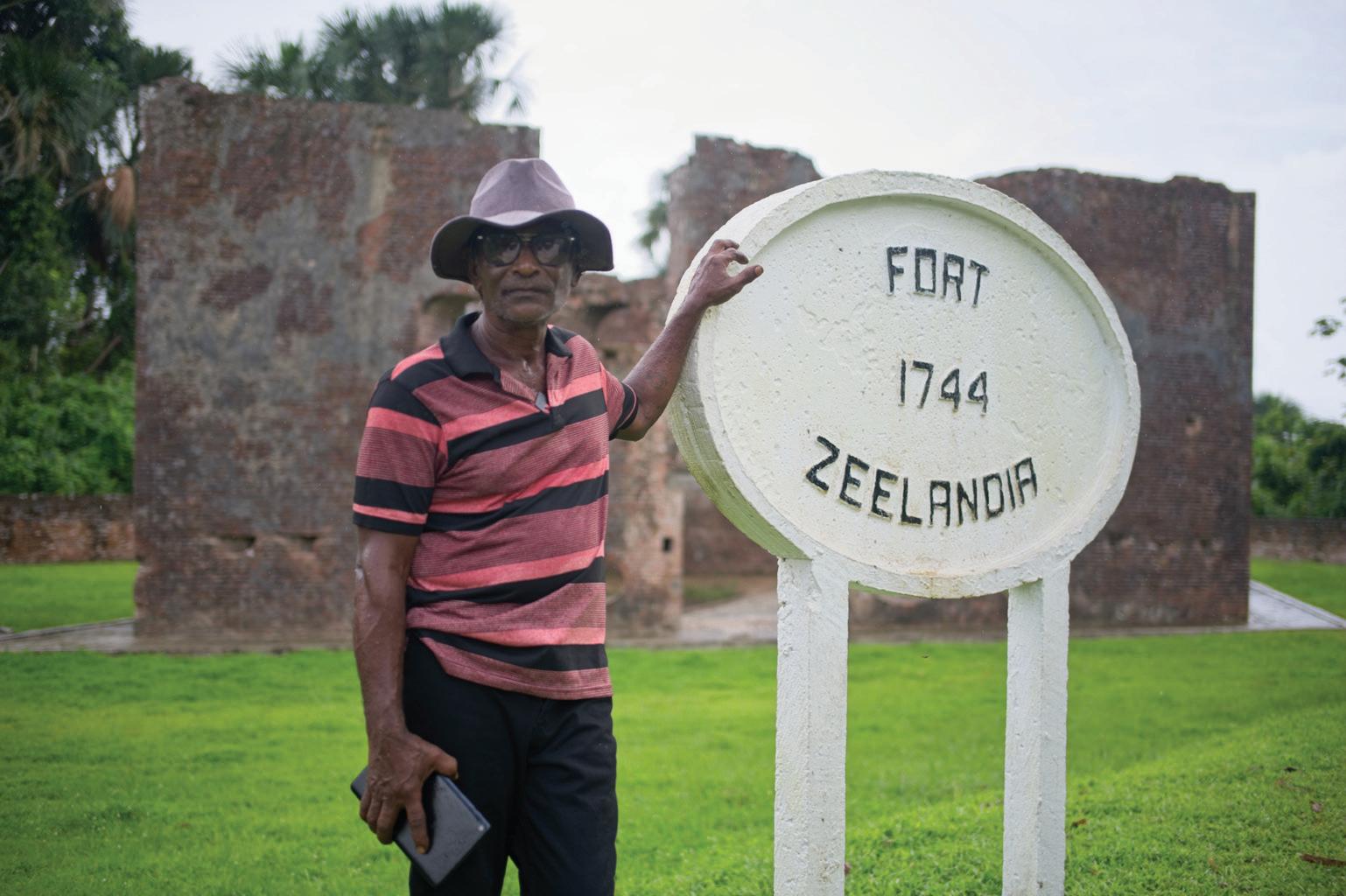

first thing that brought the Dutch to Fort Island was the soil. Although historically a military base, it was also a profound farming community. As he stated, “But the coastline of Guyana was

very productive. So they migrated to Fort Island somewhere in the 1730s, 1740s. The idea of migration was strictly for sugarcane cultivation.” Mohamed further explained the little-known fact that today’s beloved Fort was not the first of its kind but rather a greater architectural feat than previous attempts. “We already had a wooden fort at the northern part of this island, but that wasn’t in good condition. The Dutch and their company started building the Fort. This Fort was built first, and then that Fort was
demolished.”
Another interesting aspect that Mohamed looked at was the Dutch-British relationship. As he shared, the Dutch encouraged building a relationship with the British; however, this did not end the way the Dutch had intended.
“The Dutch used to encourage the white planters or the Englishmen to come and settle. They were not even paying taxes because of sugar production. By 1792, the English plantation owners outnumbered the Dutch plantation owners.”
Moreover, according to information from Mohamed, Fort Island housed countless other Dutch architectural structures. As he shared, “Fort Island had a big architectural structure which was destroyed. It was a windmill. Coming down in the late 17th century, they didn’t have this kind of steam machine. We had a windmill here that the Dutch built.” To Mohamed and a special few others on Fort Island, their community is far more than tourists have the privilege of experiencing, making it a unique home they would not trade for the world.
Tourism, like the spirit of the people of Fort Island, has never died. The island has seen various developmental improvements. As Mohamed explains, Fort Island seems to be on a steady rise with just a few kinks to work out. “Since 2021, when we had good roads and the code of policy and everything started receding, we have had an influx of tourists.” Fort Island is one of a kind, and if you are thinking about a trip to the island, be sure to look beyond the stone walls of the Fort and get to know the community at its heart.

WHEN 79-year-old Francis Debideen came to Fort Island years ago, the plan was simple. He and his wife would stay with their daughter for five years before returning to their home in the North West region of Guyana. However, this plan did not quite work out. After more than several years, the family remains on the island. Francis says he stays on the island for one reason: his family.
Francis explained that life in Guyana’s vast North West and Fort Island are not that different. Agriculture was the major means of survival in his home village, which is still the case today in Fort Island. Coming to Fort Island, miles away from his home, was no coincidence. When his eldest daughter got married, she and her new husband moved to
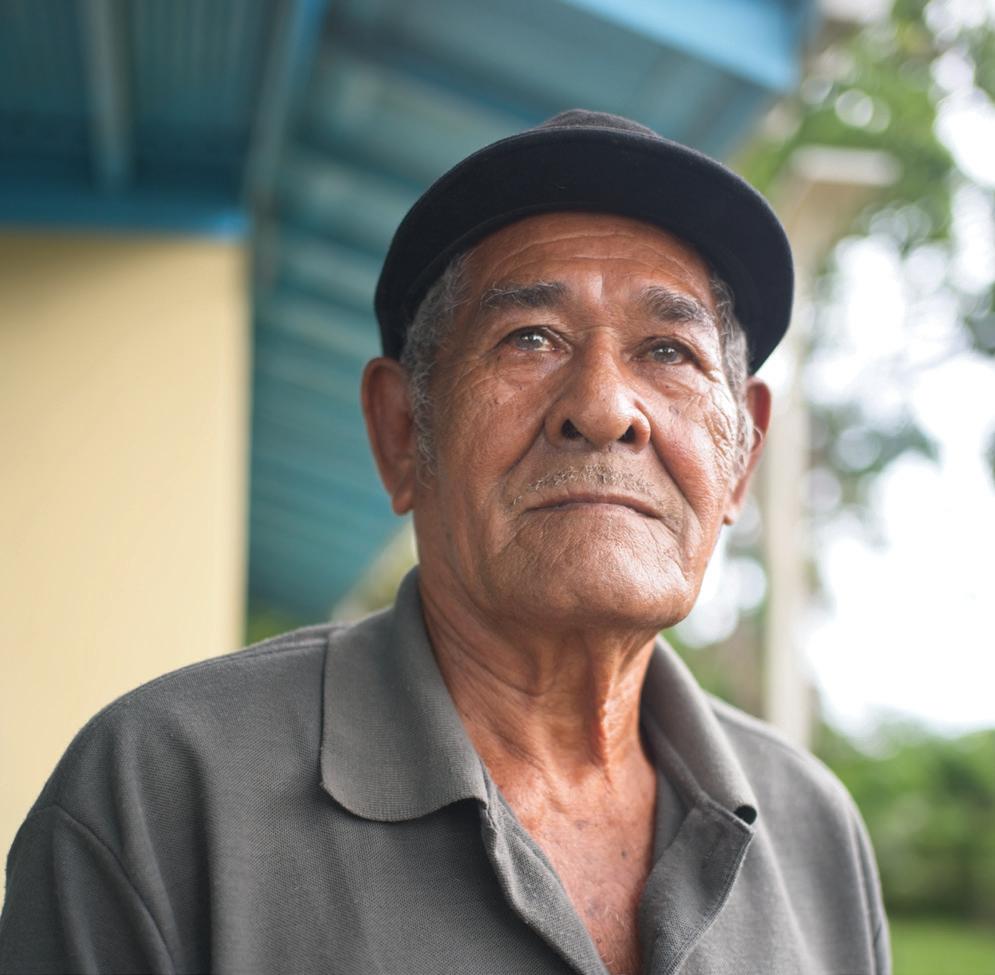
Fort Island. As he explained, she was the first to leave the family and travel so far away, “I was born and grew up in the North West of Guyana. In my day, I used to do farming and so on in the North West. And a man came there and married my daughter and he brought her here, to Fort Island.”
The importance of family and, moreover, the love of a father is what brought Francis to Fort Island. When he received news that his daughter was sick just months after coming to Fort Island, he and his wife had a difficult decision to make.
Would the father trust her husband to care for her, or would he make the journey to Fort Island, moving the rest of the family in the process? Francis chose the latter. As he stated, “When they came here, her husband came back to tell us my daughter was sick. He asked for one of us to go with her, me or her mother. I thought her mother should go. But I had my sisters living here. My wife said that we both should go; she did not want to travel alone. So both of us came to Fort Island.”
The husband and wife came to Fort Island expecting a life similar to the one they lived back home. And although farming was present, it was not the farming they knew. Francis explained that the young couple had issues developing their farm on the island. “They had land but they were not planting anything really. Just some ginger and yam. My wife said we should stay five years and give them a start before we go back. So we stayed the five years.”
After their daughter regained her health, Francis and his wife decided to stay a few years to help the young couple. These first five years were some of the hardest, he said. In a strange place with new people, Francis and his wife struggled to find work. As he stated, “We stayed. We could not get work on the island. We did not know anybody here. But we just kept going along.” Their determination was unmatched. The two persevered and sought out opportunities. Eventually,
their hard work paid off, and they both got jobs on the island, becoming a part of the island, its people, and its culture.
The family’s first big break came when his wife got a job at the local school. Although frightening, this was the first change the family had seen since their time on the island. As Francis explained, “Eventually, my wife got a job here on the island. A woman asked her to work at the primary school, and she did, and that’s how we got work. We were in a strange place, and we did not know who was who.” As Francis explained, financial situations were still challenging, but they stayed for the sake of the family. As he shared, “It was hard. The salaries could not mind me and my children. But we still prolonged it, and stayed.”
Over the years, the family quickly became more a part of the community and grew to appreciate the island. This is one of the reasons they stayed and played a major role in developing the island. Considered a jack of all trades by many, Francis was among a group of people who sought to develop multiple aspects of Fort Island, the biggest being the road. As he explained, “Because I knew a little bit of work from the North West, we decided to do a self-help and build a road. When we did, it was me, my wife, and my children who dug out the new road.”
Eventually, the family’s efforts were noticed by different ministers, and they gained support for their venture, leaving their mark on the community.
Today, Francis works a humble job as the school security guard. Life on the island has not been easy, but it has been a truly unique experience. Leaving the only home they had ever known to restart in the name of family. As he shared, “I am glad I get a job here. I don’t have to jump over wood or lift bags or dig, plough, or go on any boats. I am already old, and I thank God I am still here.” Francis now lives a simple life, still with his children and now grandchildren at heart and a father’s love as his driving force.


Just beyond the mouth of the Essequibo River, the famed Fort Island can be found. Home to a hospitable few, Fort Island has become synonymous with tourism. The island’s appeal is undeniable and continues to attract people from all walks of life. Charline Ward, however, seems to have been drawn to the island for different reasons. Growing up, her teachers had the most profound impact on her. She knew when she was quite young that educating others was what she wanted to do; she just did not know it would be on the gem that is Fort Island.
Teaching, even with all its challenges and trials, is something that Charline felt drawn towards. The passion for education seemed to be a family trait, as she explained, “I was born at Western Hogg Island School. Growing up there, I always admired teaching. My father was the headmaster of Western Hogg Island Primary.” This early exposure to the world of education undoubtedly shaped her aspirations and set her on a path toward becoming an educator herself.
Charline began her teaching career as soon as she could. Still a teenager herself, she tried her hand at teaching older children before settling on primary and nursery schools. “In 1980, I became an acting teacher at Western Hogg Island Primary School. I worked there until 1994, then left to go to training college. After finishing my training, I came back to Western Hogg Island to serve the community,” she said. Her dedication to her community and her willingness to return and contribute to the place where she grew up speaks volumes about her commitment to education and her desire to give back.



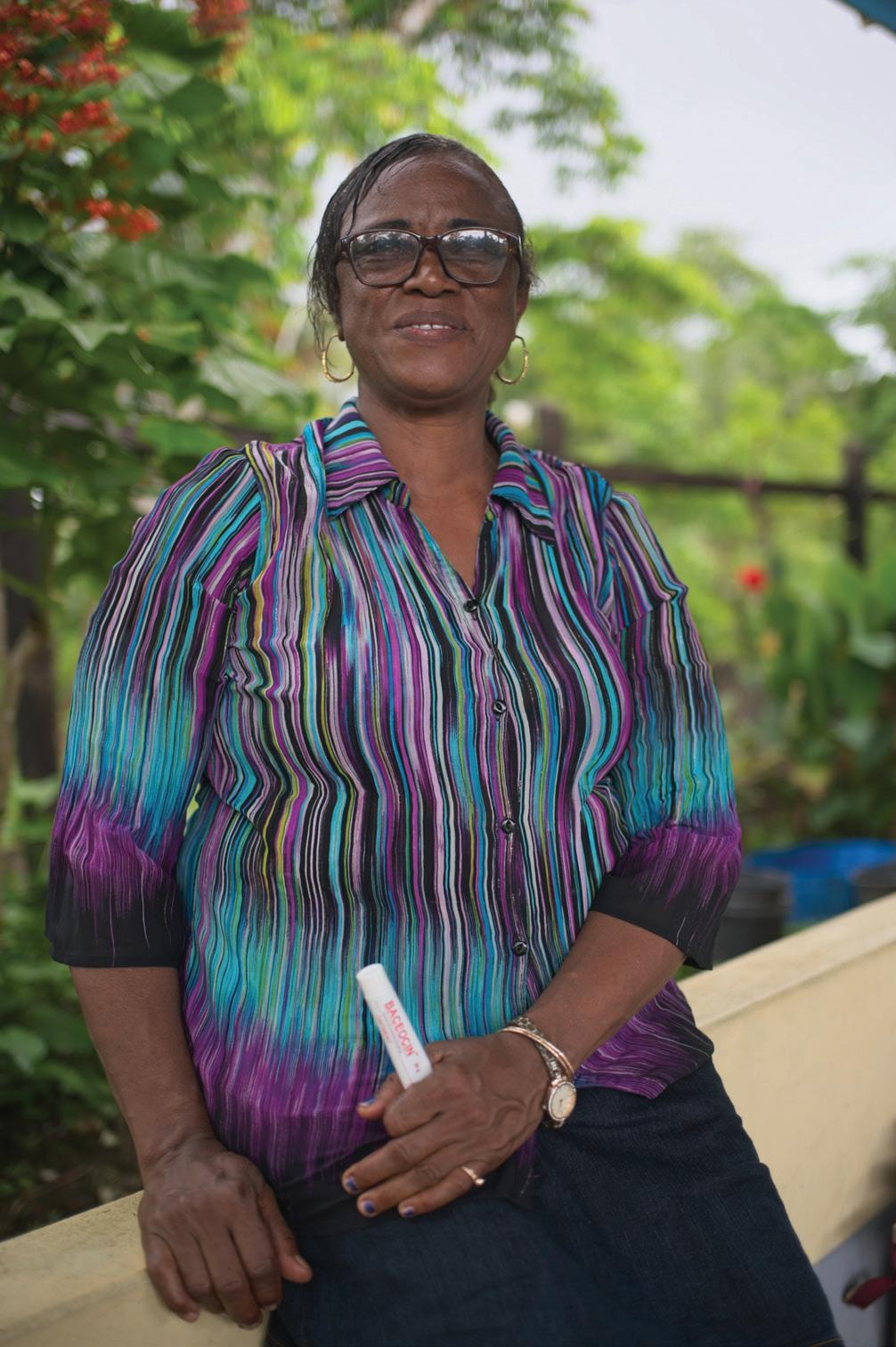
Charline served her community for many years. However, after more than two decades, the opportunity for a new position presented itself on Fort Island. Charline knew about the island and had distant relatives there. As she stated, “After seeing a vacancy at Fort Island Primary, where I could upgrade myself to be a head teacher, I came over to Fort Island Primary. I enjoy working with children.”
Charline says the best part of her job is that it is truly fulfilling. Looking around the island, Charline sees dozens of young professionals she is proud to have taught. As she shares, “I have seen the fruit of my labour. I have students who are nurses and doctors. And I have a student who is working here at a ceiling as a transport manager or a clerk, something like that. I have another one working at Transport and Harbors as a captain, as part of the team. I just love children.” The pride she feels in seeing her former students succeed in various fields is a testament to the impact she has had as a teacher.
Although she retired from teaching more than five years ago, Charline has returned to the classroom. As she explained, “Right now, I’m back at the school teaching the nursery children as a 10-day worker because I just feel like I have more to give to the children. I am at the nursery department, teaching the children to write, to learn, to read, and so forth. I just love dealing with children. I love teaching them. I enjoy teaching them. I could go on until the end of time. Until God takes me, I could go on teaching the children.” Her passion for teaching is evident in her continued involvement and her unwavering dedication to the children. Although education in the region has improved, there are still some challenges the island and its neighbours face. Among the major battles the youth face happens after completing their primary education. Some islands house secondary schools; Fort Island is an exception to that rule. This, Charline says, has had a big impact on the young women of the island. She explained, “In the girls’ case, they would drop out of school, and then, after a few months, you would hear that they got married or went off with someone.” She further added, “They eventually drop out from school. So, there are a lot of challenges around the area. I think so. I have two daughters who have graduated from Cyril Potter College of Education.”
FROM PAGE X
Over the years, Charline has gone the extra mile for the children in her care, many long after they have completed primary

school. She told of how she would go above and beyond to help create new opportunities for the island’s young people. Charline says she does it simply because it makes her feel proud. “I felt so great doing that for them. Go and get a letter, get a medical. Go and take them into the curriculum. Go and visit them every month, along with their parents. And they, too, were graduating in clothing and textiles.”
Today, Charline works as hard as she can to help further the youth of Fort Island. Her only inspiration is her passion for the profession. As she shared, “Because of my love for children. I love children. I love to deal with children. I love to hold their hand and teach them to write. I also love to teach music. I taught music at Fort Island Primary School. And here I enjoy being with children.” Charline’s story is a powerful reminder of the impact dedicated teachers can have on their students and their communities.



lia’s Ward.
PAGE V
She pointed out how people worldwide come under “pressure” to drastically change their lifestyle because of a health issue. “Sometimes that can be very strenuous. But it’s a transition; you have to gradually do it in order to get accustomed.”
Most people, she pointed out, do not feel that they can eat without meat. “But if you just remove that from
your plate, you already have somewhat of a vegan meal there. Also, I wouldn’t tell persons to cut out the salt right away.”
Apart from the nutritional aspect, Locsfest will also showcase the Rastafarian culture and clear up some wrong beliefs held by the public. “Once you see persons with locks, it’s not that they’re into weed. That’s just the misconception, and I want to change it. The whole idea is to counter stereotypes.”
The festival will also
showcase the crafty and designing skills of the Rastafarians and how they fully embrace their cultural wear not only on special occasions. “We will also be showcasing locally made products because, of course, you embrace naturalness, so anything as it relates to the skin and hair you find it would be more of a herbal remedy, even with the herbal medicine, because we really don’t go to the hospital unless it’s necessary.”
Besides all of the foregoing, though, Setra absolutely

loves that she doesn’t have to comb her hair every day and find styles for it. Apart from not having to comb it out daily, she adores the other practical benefits of keeping her locks.
On a bit of a religious note, she said about the locks: “We believe that our hair is like our antenna. It stores energy and all these things. Rastafarians are very particular about who touches their hair because they believe that they can collect and transfer energies through their hair so you find most of them are very protective of their hair; they usually wrap it up or they have specific persons that they allow to touch it.”
Tickets for the event cost $1,500.


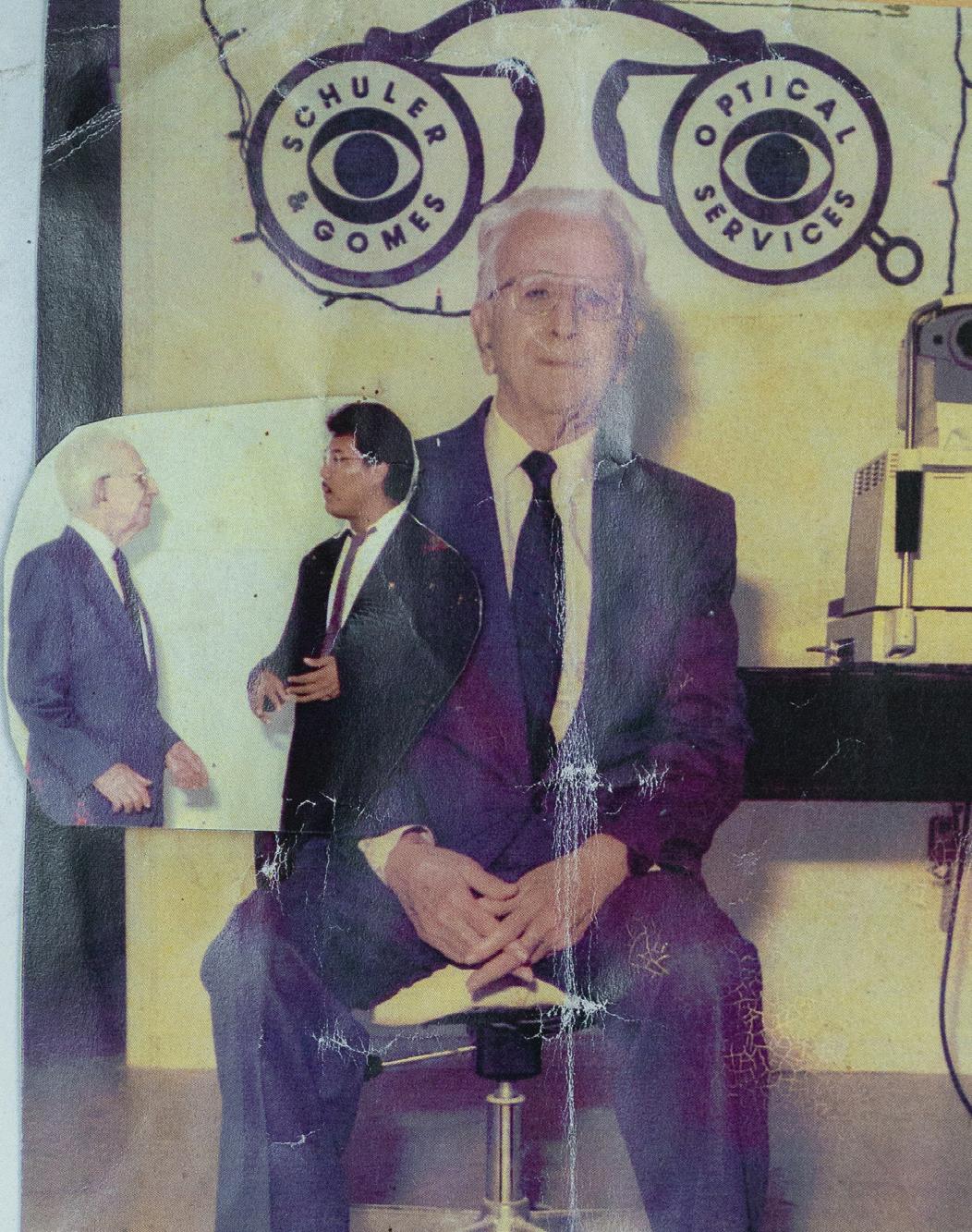
FROM PAGE II
reer, I liked serving the people, and during that time, I met a lot of good people who became like family,” he said.
The father of five pointed out that of his children, his daughter may take up the business, but he remains hopeful she does.
Gomes admitted that he didn’t want to become an optician, but he followed tradition, and it was expected of him to do so, to carry on the family business.
He had his eyes set on becoming a military helicopter pilot; it was his dream, a vision he had as a small boy, but he had to give it up to fulfill his quest of becoming an optician but he has no regrets.
“I wasn’t pushed to do it. I did it because I wanted to,” he said.
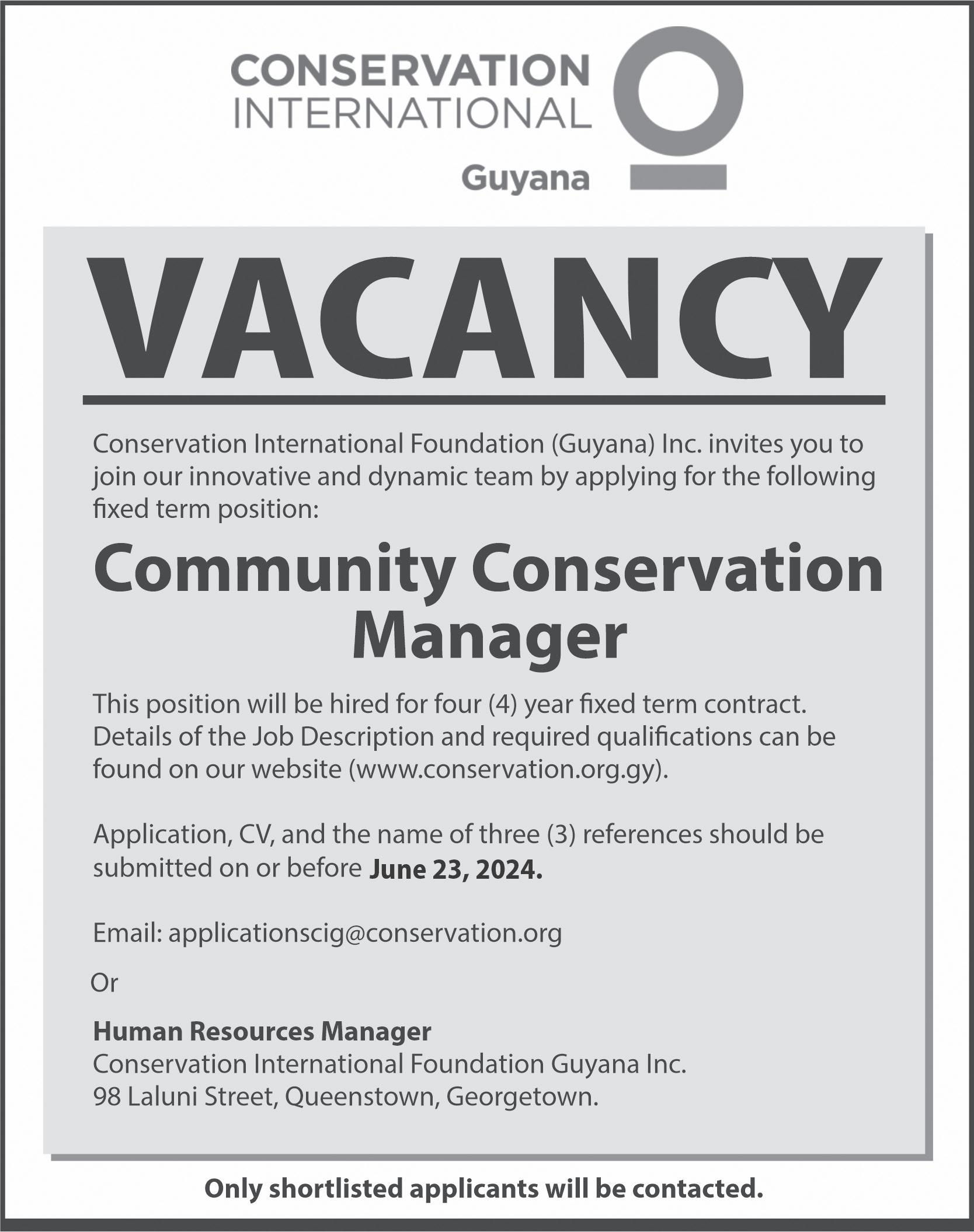
Today, Don Gomes Optical is located at 71 Brickdam, Georgetown and is proud to have given100 years of service to the people.
“The profession has allowed me to become friends with a lot of people and I am truly revered by my patients; it gives me certain responsibilities to the public and I see it as my social responsibility to the people,” he said.
Gomes noted that he has been in the business for 41 years, from 1983 to present day, and he is very happy to have been a part of the lives of so many people over the years of service.
He told the Pepperpot Magazine that although he worked between Guyana and Canada, it was a wonderful experience, and the best part about the job is getting to know people on a one-on-one basis.
Gomes, however, continued to qualify himself and he also studied in New York, USA.
He reported that he did a lot of community work locally, and he ran for office in City Hall in 2016 to serve in constituency eight Stabroek/ Wortmanville. He didn’t win but is still cleaning up the city.
Gomes was the recipi -
ent of the Medal of Service (MS) by the then President of Guyana, Dr. Bharrat Jagdeo, in 2011 for 14 years of service to the nation for his contributions to Mashramani celebrations.
He was born on September 28, 1957, in Georgetown, married with five children, and his education status is Central High School (Georgetown), Ottawa University, Seneca College of Applied Arts and Technology (Canada).
Gomes’ interests are community service, music, reading, research, writing and history.
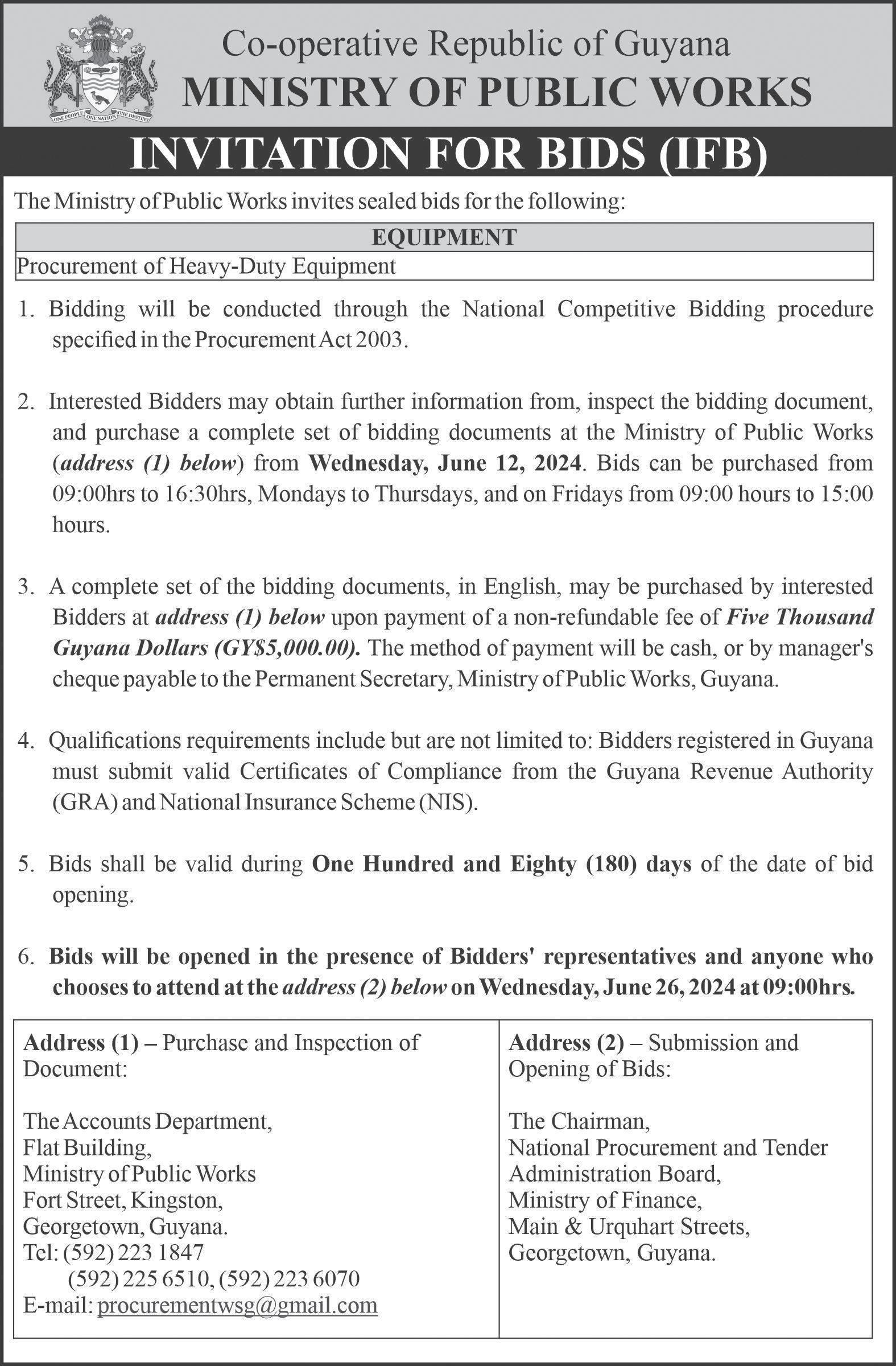

“Now I had to leave that,” he sighed with a shiver of regret.
His sister, Maya, has promised him she would take care of his plants until he could return home.
“IF only I can see you,” the old man muttered quietly, “One last time, my sons.” He wheeled his chair to the window, looking out to the expansive garden of the nursing home. He loved gardening, and it was one of the things that gave him peace of mind and a therapeutic cure for loneliness.
“Will I be able to?” he wondered, a tremor of fear pulsing through his body.
He looked at the other patients there, walking around slowly or just sitting staring into emptiness. The many roads one had walked to build a life, the

stumbles and sacrifices, the times spent with family, the celebrations, the love and laughter, until it was all gone one day.
“I know no one here,” the old man expressed quietly, his voice shaking, “A strange place among strang-
right arm and leg, and his speech was a little slurred.
He wasn’t sure what had happened to him that day and had managed to call Maya before collapsing. He had awoken hours later in a hospital room, his concerned siblings by his bedside, but
angry, and he would lash out at those close to him.
No one except his mother knew he was suffering from a mental defect of the storm in his head, thus his anger and aggression, and that’s the reason she had exercised patience with him.

ers.”
They had brought him there, his younger brother, Rudra and his sister Maya, after he had suffered a stroke and the doctor had advised he needed 24-hour care. He had been living alone for a long time, with no wife or children and no other family members who could afford that time to take care of him. Rudra and Maya had always checked on him to ensure he was doing okay, but his older siblings did not have the same care and patience. The stroke had taken away the full use of his
deeply upset with him also because of his negligence in using his medication. They had dedicated some of their time to care for him since their mother had passed away six years ago, despite his stubborn and sometimes rebellious attitude.
He was a rebel he had been since a young man, different from his other siblings and giving his mother and father much heartache. It had seemed to society that he was not normal, and sometimes, when people laughed at him for his erratic behaviour, it made him
There would be calm periods when he behaved normally and then the noise in his head would start again, and he had asked his mother, “Why is this happening to me?”
She couldn’t give him any answer because she didn’t have any, so he grew up into adulthood, dealing with a storm and a calm, as such he made friends and lost friends, changed jobs, and his future did not look quite stable, but he still managed to find some good SEE PAGE XVI

OVER the past nine years of the existence of this column, I’ve argued the facts of the reality that the impact of technology is the harbinger of a new world order. This is especially true with respect to how we earn and live, in conflict with how our social normalcy has been managed from, say, the nineteen hundreds onwards. If un-
a joiner and contractor, belonged to and were close to brethren of their choice professions. To my father’s disappointment, I gravitated towards the arts, which aligned with my parents’ heritage through participation and achievements.
As a young man, the first bed that I bought was made by my friend ‘Bow-foot’, who shared a furniture work-
the Anglophone Caribbean / CARICOM nations to boast an Art School, and they both wielded their best against the dark manifestations that followed the oil crisis in their economies. The arts in its wide areas struggled, and many fled the country. Cultural industries included jewellery, craft items, art, literature, music productions, textile designs, book
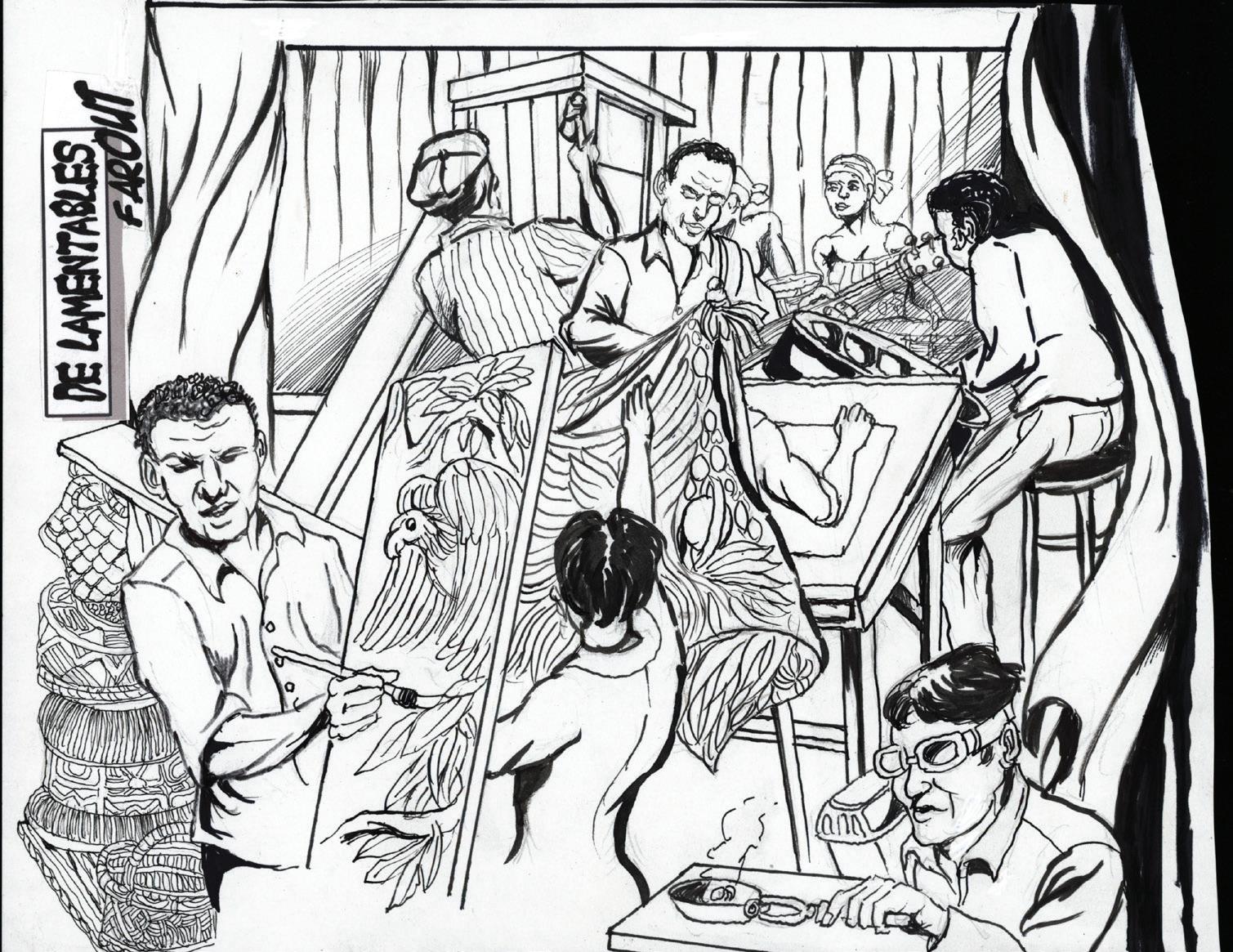
checked, even today, this will constitute mass unemployment, with worst-case scenario impacts on the nature of the individual survival thrust, with a changing impact on the national ethos that we have never witnessed or experienced locally before.
Guyana always boasted a respected cottage industry of businesses. One of the areas, among others, that we must now manage in the local interest is our forests and our diverse timber resources. I do realise that though they were not identified as ‘Guilds’ but rather as ‘Tradesmen’, both my Godfather, a plumber, whom I grew with and my father,
shop on Princess Street with two brothers. They were twins, but I can’t remember their names. In the Scheme yard (still in Wortmanville). On the Northern side, there lived Mr. Greaves, a oneman ‘wood hanger factory’. His hangers were what we called “De proper ting duh.” Growing up, these were the areas that included all Tradesmen, and many youngsters gravitated to them. Shirts were locally made, such as Windsor, Mr Mod, and Alladin’s Cave, to mention a few. The oil crisis floored many of those bigger industries, including BATA and government projections. Jamaica and Guyana were the first two nations of
publishing, novels, and illustrated books, both fiction and non-fiction.
What has been a cry of especially the Craft and Jewellery producers is the wanton plagiarism of their ideas by the multiple copyists preying on their creativity. This is where the ‘Commercial Registry’ should come in, to protect and provide guidance and its interpretation. I doubt that there could be a law prohibiting this natural protection of a citizen’s right to benefit from his/her efforts. This is the dormant potential that is not discussed, as if they, or

FROM PAGE XIV
things in his life despite his mental struggles.
He met a girl he loved and got married. It was the best thing that had happened to him, but on the days when the storm was at its worst, he treated her badly. She would return to her parents’ home until he went for her, begging for forgiveness, and so it continued until she bore him two sons. A proud father he had been, promising himself he would always be there for them but faltered repeatedly. His wife, unable to take it anymore, had taken the boys and left for good. He had nothing new to offer to bring them back and they drifted apart.
He went back home to live with his mother, the only person who understood his problem and was patient with him. So when she died, it devastated him so much, he broke down and developed hypertension through stress.
His siblings had tried to help him through it, but his rebellious attitude pushed them away.
“I don’t care,” he had reacted angrily, “I don’t need anyone!”
But in his quiet moments much later, he regretted saying those words. “I have lost so much,” he rued as he sat there in the wheelchair, a lump forming in his throat, “And I caused them all to think of me as the bad guy.”
He hadn’t seen his sons in years, having not played a meaningful role in their lives, not knowing how big they must have grown, their careers, and their success stories.
He sighed deeply, an ache in his heart. Life for him had been filled with so many challenges, many of which he had lost, and he wondered, “Is this where it all ends for me, away from family? Would I be able to see my sons to tell them I am sorry?”
Tears gathered in his eyes, the old, helpless man he had become, and as he was helped to bed that night, he muttered, “One last time…”
The days turned into weeks, and it seemed like a

miracle that his health was stable, and strangely, there had been no storm in his mind for a long while.
“Am I cured of it?” he wondered, “When it’s too late?”
Father’s Day was approaching, and though there was some excitement among some of the male patients, the old man felt no enthusiasm except a little hope. On the day before Father’s Day, Maya and Rudra visited him, giving him a haircut and trimming his beard, giving him a presentable outlook.
“Why all this?” he asked.
“So that you can look good for Father’s Day.”
“What does that matter?” he asked, pain in his voice, “If there’s no one to wish me that.”
Neither of them could answer that, although a message had been sent to his sons that he wanted to see them, they had received no response.
He shook his head, a sad look in his eyes, “I don’t think they will ever forgive me.”
“You never know what tomorrow can bring,” Maya said with a positive tone.
On Father’s Day, he sat in his wheelchair by the window, watching families come and go, no one for him, but he held onto his little hope, not wanting to let it go. But past mid-afternoon, his hopes began to fade and he muttered resigningly, “I guess I deserve this.”
He sighed deeply and just then he heard two deep male voices say, “Dad.”
It was the sweetest sound he had ever heard in his life.
Turning his chair slowly, he saw two tall, handsome young men standing in the room. Joy filled his heart and he stammered, “M-mmy sons, y-you came.”
They stood there for a while, not saying anything, and then the eldest spoke, “We were told you wanted to see us.”
He nodded his head, “Yeah.”
“You don’t seem to be doing well,” the younger son said.
He nodded his head again, then said slowly, “I want to say I am sorry, for failing to keep the promise I made to you when you were little boys.”
The eldest son came forward and handed him a gift, “That’s fine, we hold no enmity against you, it’s all in the past. Happy Father’s Day.”
The younger son came forward with his gift and wish and said “Hope you get better soon.”
Tears streamed down the old man’s face, “Thank you.”
They stayed for a long while more, not saying much but just being there and when they were ready to leave, he asked, “Would I be seeing you again?”
His sons looked at each other, not answering for a while, then said, “Yeah, when you return home we will visit you more.”
The old man smiled, his heart rejoicing, “What better gift is there, more than that on Father’s Day.”


OVER the last four years, the agricultural sector, under the leadership of the Minister of Agriculture, Hon. Zulfikar Mustapha, has been experiencing a veritable revolution. One aspect of this revolution has been the introduction of new crops and upgrading various farm animals such as poultry, cows, and pigs.
The underlying motivation of this Agricultural Revolution is the commitment to achieving food security for Guyana and the Caribbean Region, to raise the nutritional intake levels of the population and to eliminate the 6 billion dollars the Region annually spends on food
imports by producing these same foods locally.
One of the new crops introduced is Millet. One thousand three hundred acres of Millet are under cultivation at the Tacama Mega Farm on the Berbice River and the acreage would be further expanded in Regions Five, Nine and Ten. India is the major millet producer and user in the world and does most of the scientific and social research on grain.
The Ministry of Agriculture has cultivated a very fruitful relationship with the Indian authorities, thus ensuring the orderly success of the project.
Millet is among the first
cereals cultivated by human beings. It is found in all the ancient civilizations from the New Stone Age and remained the most used cereal in the world until about 50 or 60 years ago. At that time, rice and wheat cultivation had increased their productivity manyfold and became cheaper and State authorities, in many cases, promoted their use. Millet use and cultivation were left to the poorer classes, who continued to use it.
The aura grew about it; it was the food of the poor and underprivileged, while wheat and rice unjustly came to be regarded as desirable cereals. With the advancement of
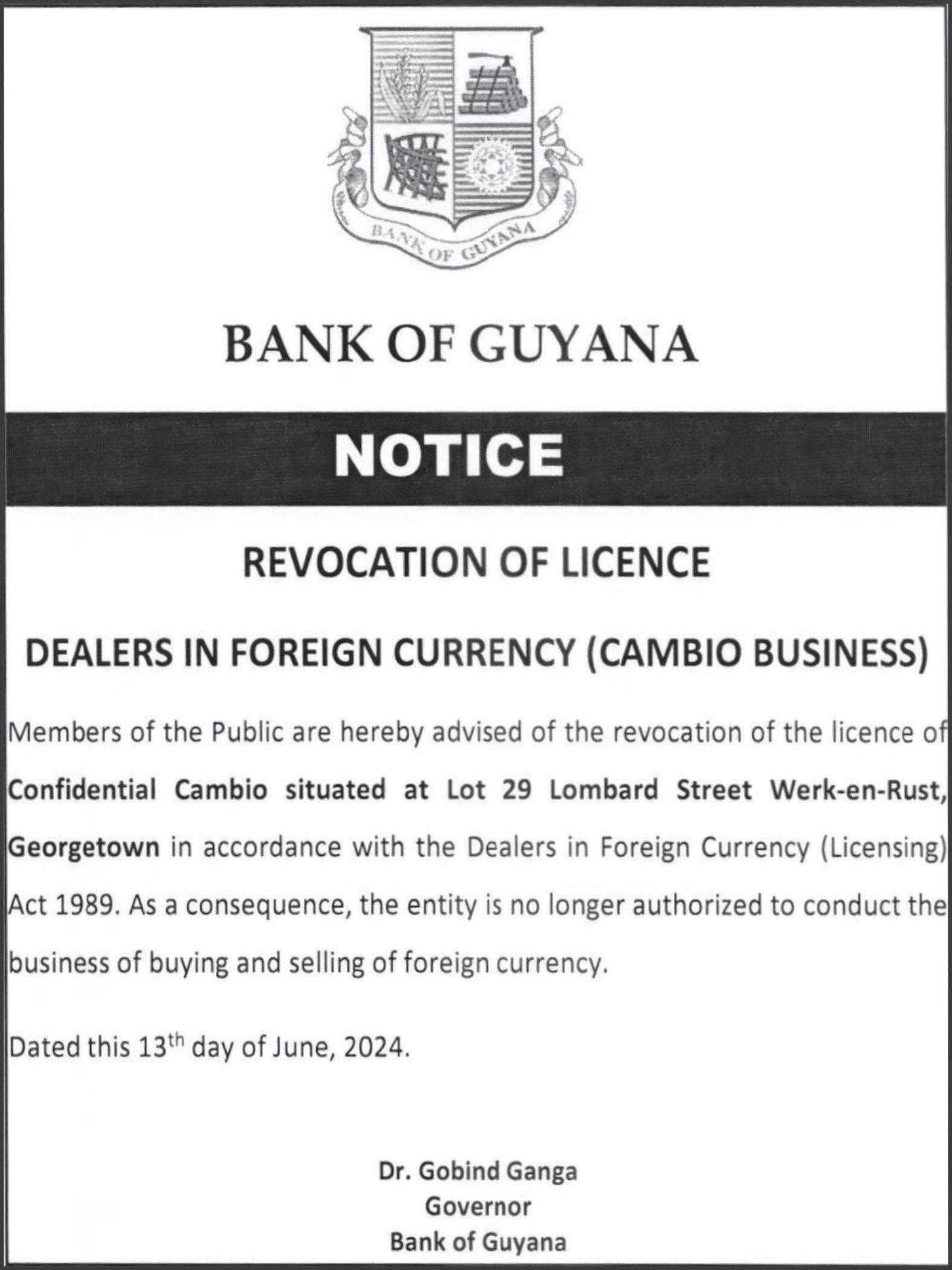
research, it is now known that Millet is nutritionally superior to both Rice and Wheat. Millet is high in nutrition and dietary fibre and is a good source of protein, micronutrients and phytochemicals and is gradually being restored to its rightful place.
Millets can be ground into flour or consumed whole, like rice, and there are hundreds of recipes for them. It could be used for cakes, bread, roti, porridges and confections and remains among the most versatile of cereals. Rice and wheat are normally grown on irrigated land, which involves the cost of water, while Millet is grown on rain-watered land and is easily adapted to hot and dry climatic conditions and poor or marginal soils,
and its cultivation is, therefore, more economical.
In this regard, Millet could be a great social and economic benefit to Haiti since a great part of that country’s land had become infertile and marginal with careless use over the 18th and 19th centuries. The Guyana Consumers Association had written the CARICOM Secretariat to consider measures to have Millet introduced to Haiti, and this could be done in tandem with Guyana’s programme with possible assistance from the Government of India.
The President, H.E. Dr Irfaan Ali has shown a special interest in the introduction of Millet to Guyana and the Caribbean and participated virtually
in the Global Millet Conference in New Delhi which was in conjunction with the United Nations’ declaration of 2023 being the International Year of Millets. In his presentation at the Conference, Dr Ali remarked: “The declaration of this International Year (IYM) is linked to the recognition that hunger and food insecurity are potent threats to the attainment of the sustainable development goals . . . Guyana has identified the production of Millet as having great potential towards enhancing national and Regional food security. As the Caribbean Community (CARICOM) implements ‘Vision 25’ by 2025 to reduce the food import bill by approximately $US 1 billion by 2025, Mil-







FROM PAGE XV
should I say, ‘We’ do not exist.
My dismay came years ago when I needed a drawing table and called the Technical Institute asking what their current price for building a drawing table was, and they said that they don’t make them anymore. I had to import one from Blick Art - a US art store. This was some 15 years ago.
These areas have lacked meaningful state observation and investment because the minds who can define and elaborate the contextualism are professionals in their fields and are not speaking the same language as appointed technocrats, who may find it challenging to interpret the stage of references deliberated. Nevertheless, there is ‘the other’ who can fulfil the necessary void because as citizens, they need their interests to be addressed. There are no known stipulations for barriers to such a practical and significant discussion.


AS I recall the good days of my childhood, there’s a small detail I would often remember from my mother and grandmother. It is a red lipstick. Now, this might not be an atypical thing to remember, but its significance is the reason why I often do it. This is not necessarily a column on beauty tips, but hear me out as I try to explain.
My mother, on the other hand, wore red lipstick to prove a point further. First, there’s a misconception that women of colour cannot wear red lipstick. I’m not sure who made that “rule” up, but my mother is always determined to prove that this is simply not true or right. In fact, when my father first met my mother, he met her
makeup, yet we still wear it because we want to.
My mother and grandmother inspired me to not listen to others and their opinions. Those small details of rebellion against the “norm” motivated me to wear red lipstick from time to time. There is a powerful symbol in these acts of defiance toward beauty standards, and

My grandmother often mentioned that she loves red lipstick for its boldness. She wore it almost every time she went out. She wore it at formal occasions and even to church. That very lipstick is similar to her personality—she was perhaps the “red lipstick” of her peers. She was unapologetic, confident and, of course, bold until her very last day on earth. I loved that trait about her very much.
with red lipstick on. That is a detail he always pointed out. To this very day, my mother still wears red lipstick, and that trademark has been passed down to me. You see, I was once bullied in high school for wearing makeup. I was made fun of because my skills were less than amateur level. In fact, I was always told, “you don’t need makeup”. Comments like that no woman ever wants to hear. We know we don’t need
I urge you all to wear whatever makeup or accessories you’d like to— despite what the majority says. We’ve come a long way from the Stone Ages to still act as if we aren’t an advanced society. In reality, everyone has their own type of “red lipstick” symbolism. It may not necessarily be lipstick, but whatever it is—I hope you understand the power your “red lipstick” holds to make a statement.



















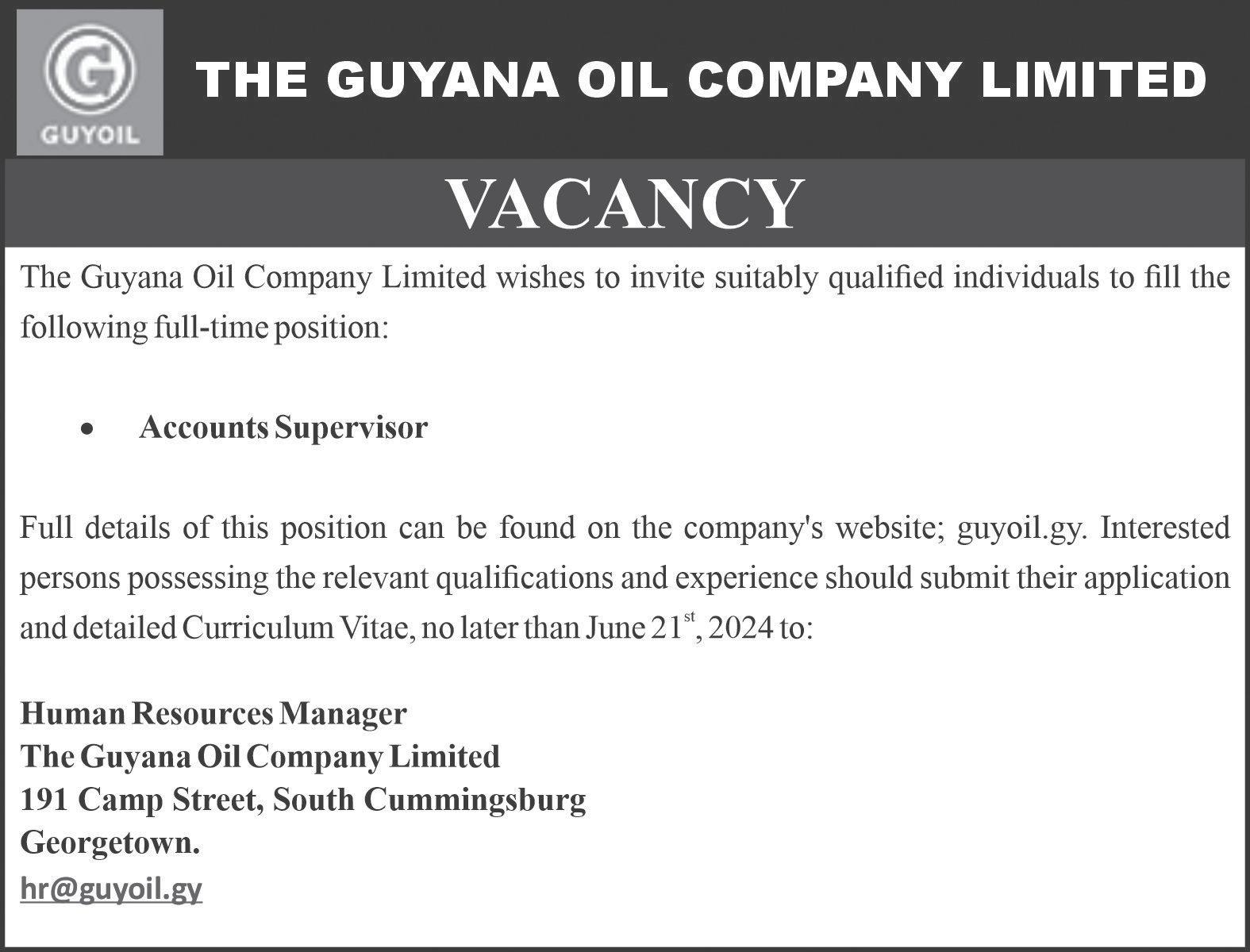










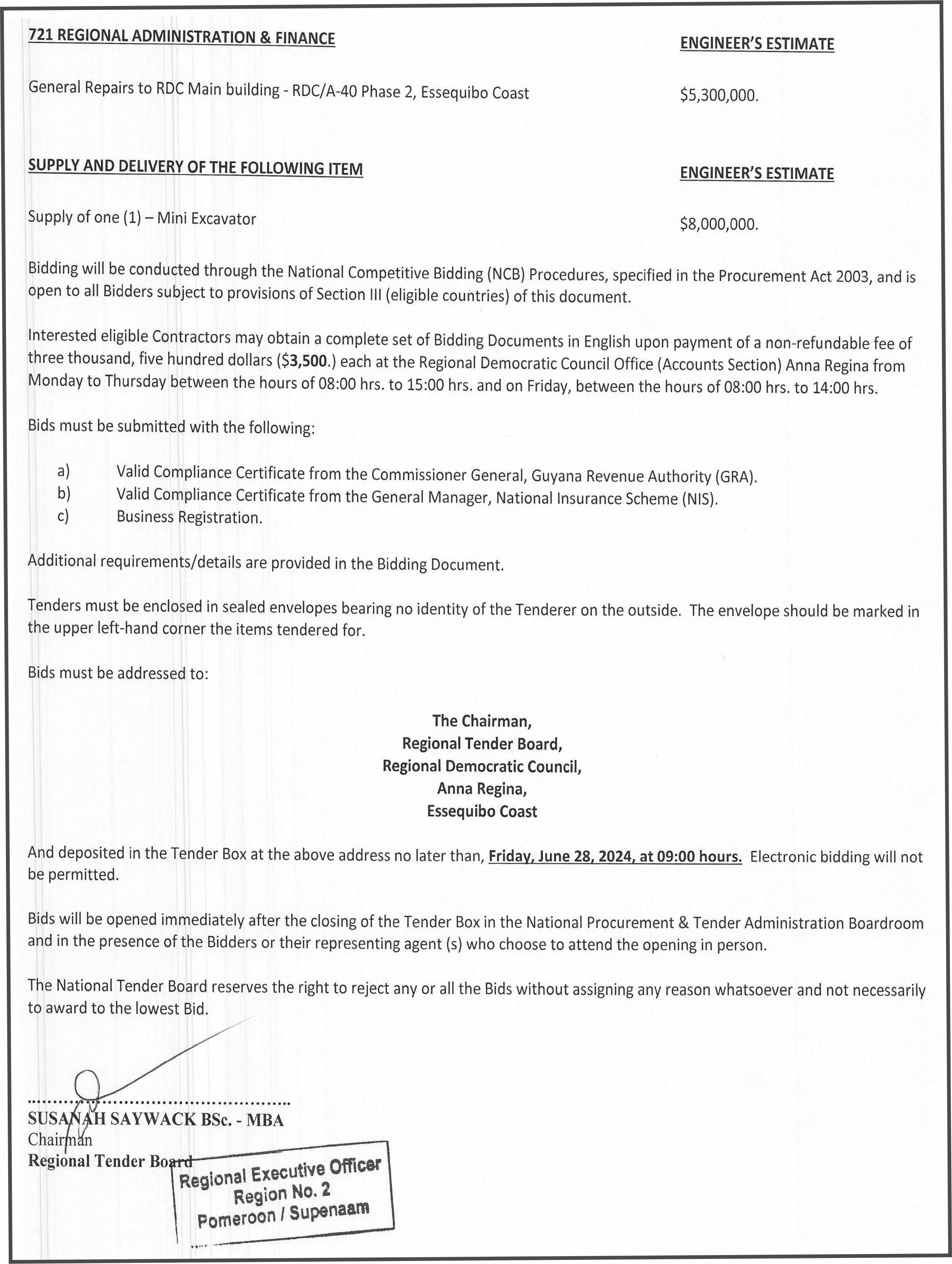










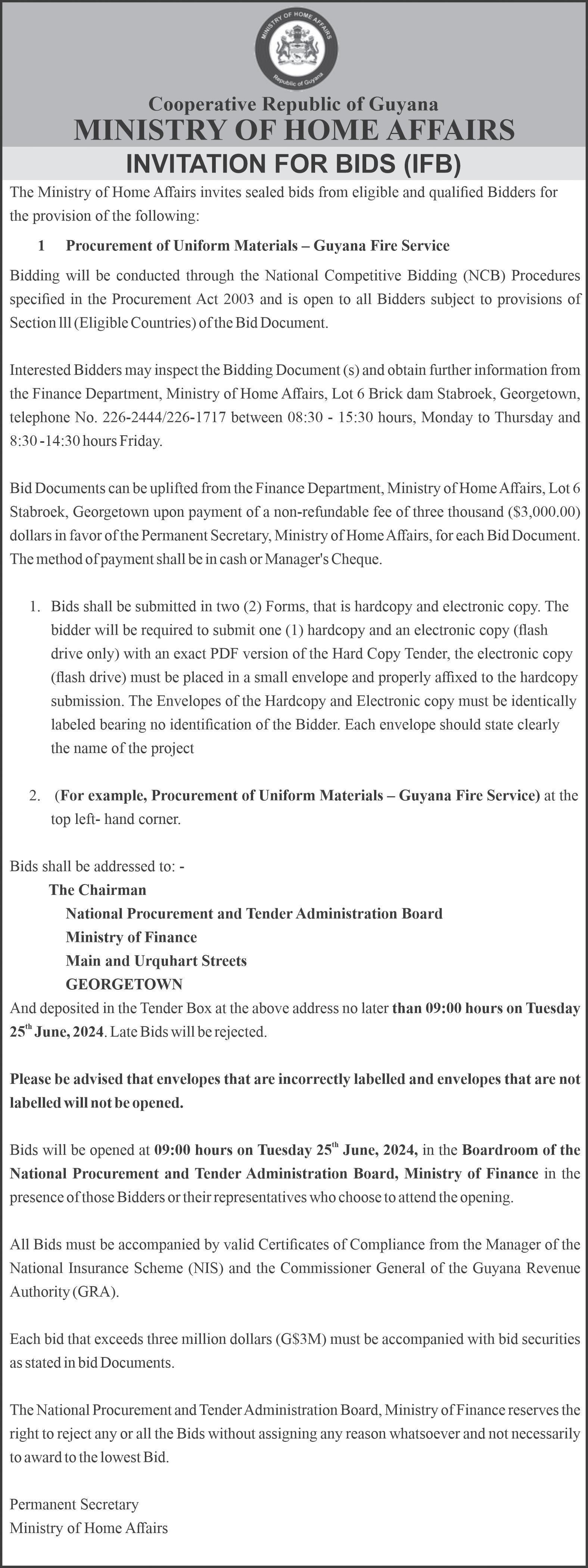





Worldly wealth he cared not for, desiring only to make both ends meet. [Of Edmund Grindall.]. THOMAS FULLER (1608-1661) The History of the Worthies of England (1662)
Dear Student,
Welcome dear friend. If you are asked to read a text and then answer a quiz and rate yourself, you require the skill of relating the text to your own experience. Of necessity, the text is usually highly motivating. It provides its own reading comprehension exercise. It influences how you rate yourself for each separate quiz question based upon it. If questions are completed successfully, it proves that you have understood the

main points of the text. Be wise. Love you.
GRAMMAR
Dealing with adverb clauses
Reminder: An adverb clause is a dependent clause that is used like an adverb or a prepositional phrase to modify a verb. It begins with a subordinating conjunction.
1. He left late. (adverb)
2. He left at 10’clock. (prepositional phrase)
3. He left after the second half began. (adverb clause)
4. The cows moved slowly on while the cowhand intently watched them pass. (adverb clause)
[Look carefully at this: a clause has a subject part and a verb part or predicate.]
A prepositional phrase is a preposition and its object, with or without modifiers. A preposition is a word that shows the relation between a noun and a pronoun, called its object, and some other word in the sentence.
● Which word introduces each of the adverb clauses in the following complex sentences?
1. Before we eat supper we will have to set the table.
2. Because I have not finished proofreading the recipe, I can’t submit it now.
3. You cannot get into the main hall unless you have a ticket.
Here you will notice that the clauses “Before we eat supper, Because I have not finished proofreading the recipe, and unless you have a ticket” are each dependent on the rest of the sentence for meaning. Each begins with a subordinating conjunction (before, because, unless). Examples of subordinating conjunctions are: after, although, as soon as, because, before, if, since, unless, until, when, where.
● By moving one or more verb modifiers, rearrange each of the following sentences in at least two different ways. [This helps with improving your writing style.]
1. With the wounded puppy in her hand, River Dade was running swiftly across the veterinarian’s lawn.
2. In due time we returned the puppy to the kennel gently, with much care.
3. Tired and hungry, the young chess players crawled into bed, pulling the covers over their heads.
4. We helped to feed the puppy with a baby’s nursing bottle during the next morning.
5. Yesterday they found the puppy’s mother limping down the road.
A look at verb modifiers: Verb modifiers can be placed in several positions in sentences. And confusing sentences can be avoided if verb modifiers are purposely placed. Place verb modifiers close enough to the words they modify for their meaning to be completely clear.
The following sentences are either confusing or absurd. Rewrite each one so that there is no confusion as to the meaning.
1. The secretary wrote a cheque for the committee member who was waiting swiftly.
2. I warned her not to lose her parking space five times.
3. The customer asked for a life jacket in French.
4. They all ran when the starting gun sounded like the wind.
You need to choose words well in your writing: Ideas can be inserted in sentences through adverbs and prepositional phrases. For example:
1. (a) My mother took the insult in silence.
(b) My mother silently took the insult.
2. (a) The elderly workmen finished the task job with patience and commendable skill.
(b) The elderly workmen finished the task job patiently and commendably.
In such cases, make your choice in terms of the sound of the sentence and where you want to focus the reader’s attention in the sentence.
Like movies or television, drama depends on a great story and great dialogue. But plays are performed live, which means they can be a bit different from performance to performance …
I’ve written novels, scripts for television and the movies, and plays. But there’s a special kind of story that is perfect for the stage: a story that features relationships between characters we care about. Since in a play, the relationships happen right in front of us – with real, live, breathing actors - it’s easy to forget that the actors are not the characters that they are playing. That’s my twin goal as a playwright: to make you forget you’re in a theater, and to lure you into inhabiting the world of my characters.
Plays are the most challenging type of storytelling. Novels allow the writer much more freedom; the storyteller can explain anything and everything. Movies give the writer the freedom to write physical scenes and to tell a story through action, both of which are impossible on stage.
(Cherrie Bennett’s “From the Author’s Desk”)
Something to Do
1. Give the meaning of each phrase taken from the passage: great dialogue; perfect for the stage; relationships between characters.
2. Explain as to a friend, in about three sentences, what you know and understand about the terms ‘movies and television.’
3. What makes it possible for a play to become a “bit different from performance to performance”? Give two of your own thoughts.
4. What kind of story does the writer claim to be “perfect for the stage.?
5. In your own words express what the writer is saying about her twin goal in the last sentence in paragraph two.
6. Why, according to the writer, are plays the most challenging type of storytelling? Give three reasons from the text.

RESEARCH has shown that nearly 45 percent of any population exhibits sufficient fear of dental treatment and that their oral health has been significantly affected. Overcoming this prohibition is, therefore, crucial.
The first thing you can do is realise that your dental fear can be overcome. Fear is a learned behaviour which, therefore, can be unlearned. Patient-centred behaviour modification treats you as a whole person, not as a set of teeth that can help you overcome your fears. This will obviously take a team approach between you and your dentist and his/ her staff.
Communication is the key. You must feel comfortable expressing your fears and concerns and feel that you are being listened to. Modern dentistry with a compassionate dental team can be truly painless. You can desensitise yourself to your fears if you take the first step and allow the right team to help you overcome your fears.
Here’s a list of other steps you can take to overcome your dental fears:
1. Asking questions
2. Establishing a signalling system
3. Learning how to relax
4. Improving communication with your dentist
Explanation and clarification of all procedures proposed is your right as a patient. If you have a question about a particular procedure, ask it! Empower yourself with the knowledge to alleviate fear of the unknown. You should have input into treatment decisions and choices. You should be honest with your dentist regarding how much treatment you think you can tolerate at first. As you build confidence in yourself and trust in the team that cares for you, the length of your appointment and the amount of work accomplished will increase.
A signalling system should be established, allowing you to stop for any reason – whether it be because you need more anaesthesia, want to rinse out, or simply need a two-second break. The most common signal is raising your hand.
If you feel tense in the chair, the easiest way to relax is through forms of physical relaxation. A relaxed body promotes a clear and relaxed mind. The human body cannot be physically relaxed and mentally anxious at the same time! The brain won’t process these feelings simultaneously. Physical relaxation methods are easier to accomplish at first than cognitive ones, so practise forms of physical relaxation first. Examples of physical relaxation are diaphragmatic breathing, progressive muscle relaxation, and various methods taught in yoga. There are numerous books and sources for these methods. If you induce relaxation in the presence of stimuli, that normally induces your fears (the dental environment), the fear response will be greatly diminished over multiple exposures, and you will gradually desensitise yourself to these fears as you build confidence. The memories of traumatic visits will be replaced with more innocuous ones and this less threatening environment, coupled with your relaxation methods, will help you eliminate your fears.
As you get more comfortable in the dental environment, you can engage in various distraction techniques that many offices have. Many offices are now equipped with Virtual reality glasses that provide both visual and auditory distraction by allowing you to view videos through these glasses while having dental work done. We only suggest using distraction techniques once you have established some trust and confidence because your ability to communicate will be compromised, although it is easy to stop any of these devices
if necessary.
If you have been ridiculed for your behaviour or are embarrassed by your present dental condition caused by your neglect, please express yourself honestly and give your present dentist a chance to understand your concerns and
show you that he/she cares. You will be amazed at the wealth of treatment options that you might not have thought were possible. It’s never too late with modern dentistry to recreate a new smile! Communicate, empower yourself with knowledge and take control of your fears.

